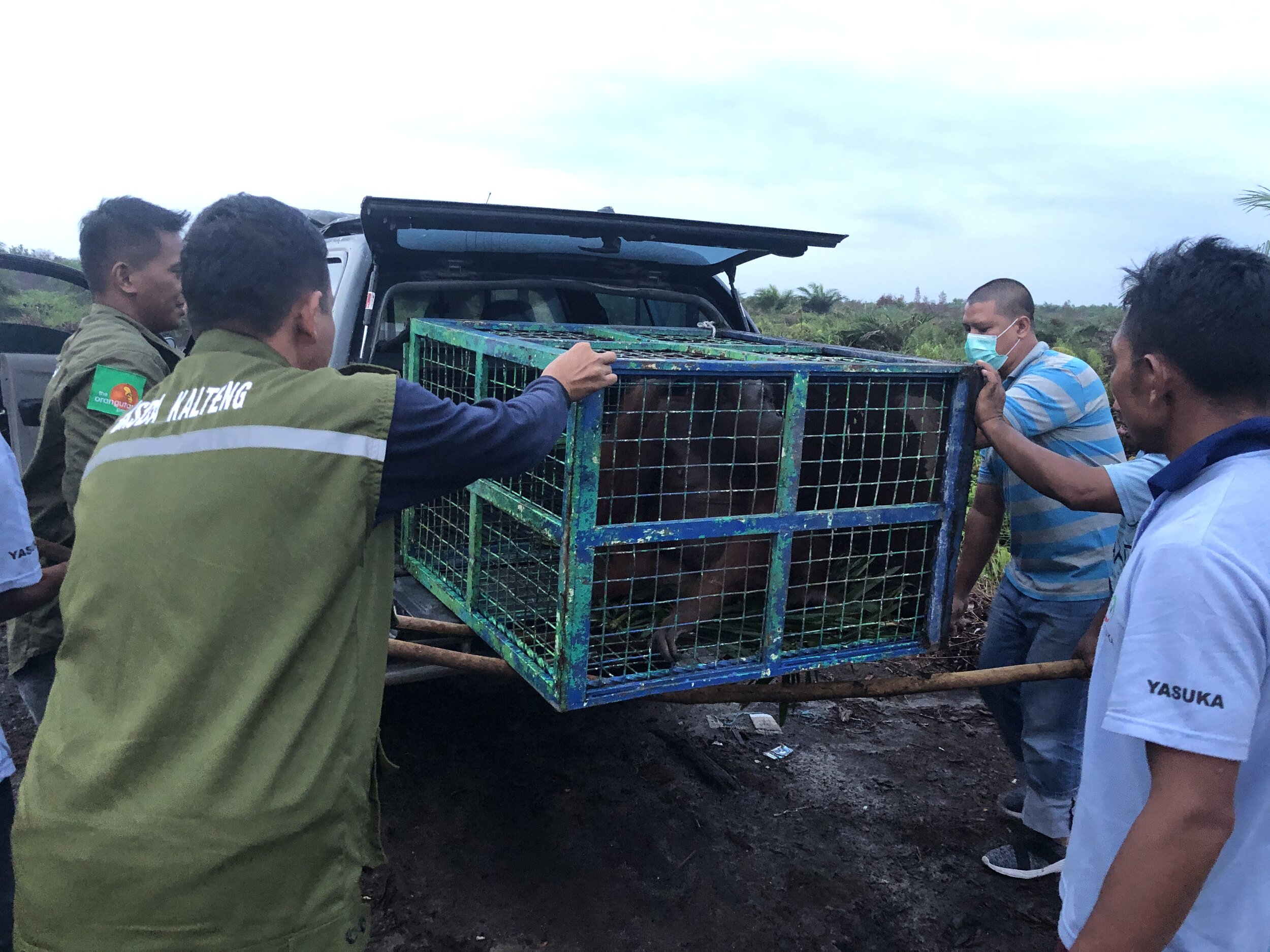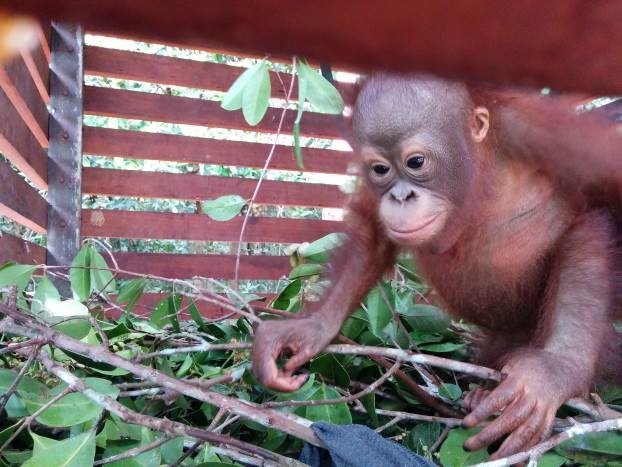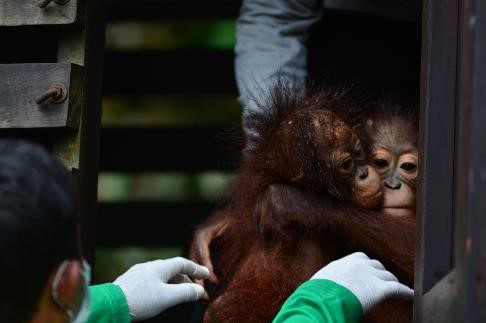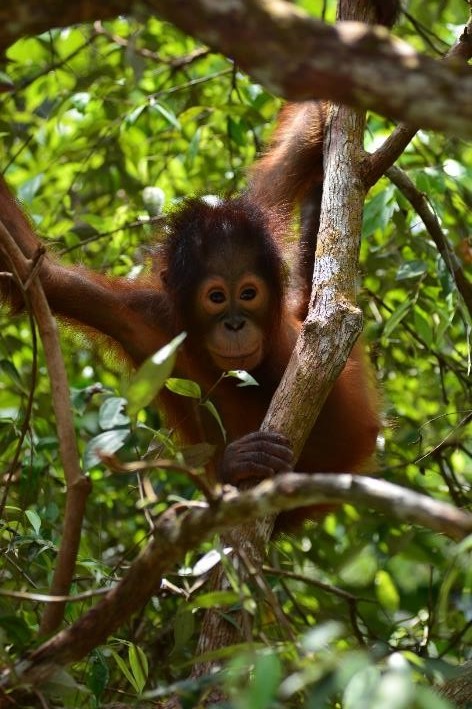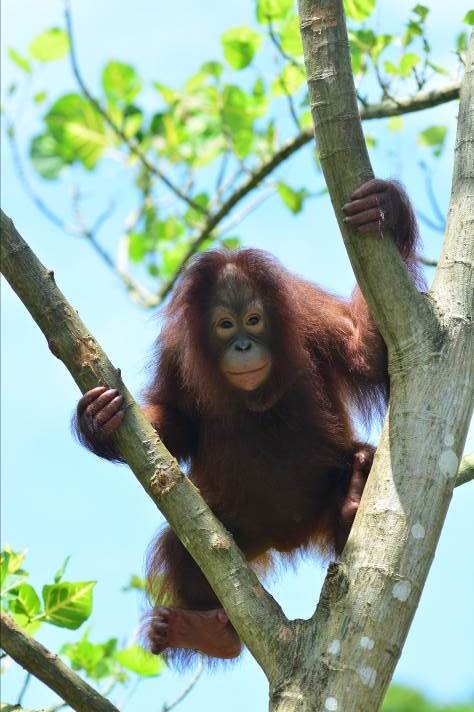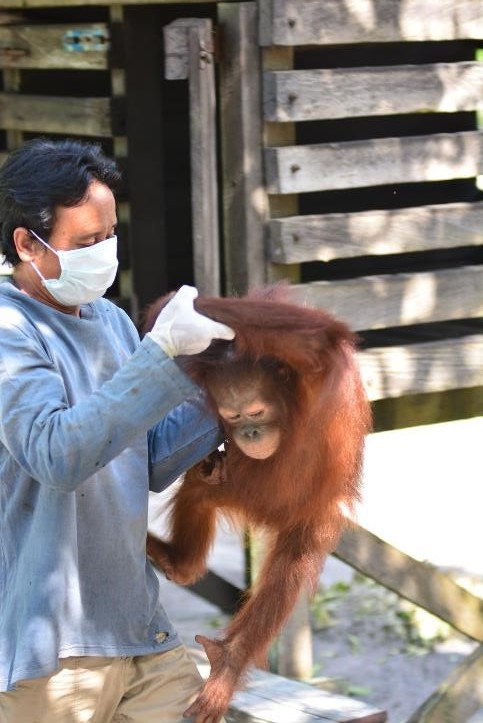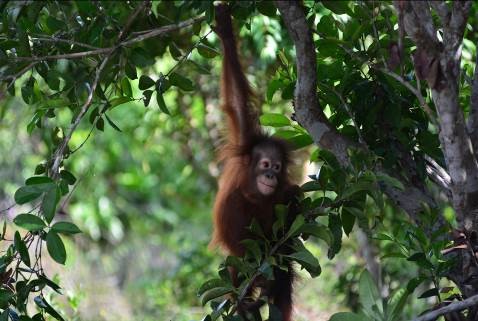Gunawan in the soft-release programme is growing in confidence… on his first attempt at climbing, he is here to show that a life in the trees is instinctive for the forest ape.
Mother and baby orangutan rescued and reunited
Following on from the 6 individuals who have been rescued and translocated since mid-July, Orangutan Foundation staff in Central Kalimantan, Indonesian Borneo were alerted to yet another emergency earlier this month.
Reports from BKSDA government officials suggested that an orangutan had been found by a group of villagers who had discovered the great ape when it ventured into an area of community plantations- quite possibly searching for food as a result of the remnant fires that have blotted the region in recent weeks.
On arrival, our team were able to observe that the orangutan was a female who had already been independently captured by the local people and put inside a transport crate. Explaining that this action should only be conducted by trained personnel, Orangutan Foundation staff then began their journey back to base with the orangutan in toe. However as our team were to soon find out, this was not the end to this orangutan’s story.
Shortly after the rescue our team received a worrying piece of news. It transpired that during the capture of the female orangutan, she had also been separated from a young infant that local residents wished to keep as a pet. Fortunately however, Orangutan Foundation and BKSDA officials were again on hand to rescue the orangutan baby from the community and reunite it with its mother.
Our vet was very pleased to see both orangutans in good health following medical examinations and observe the infant immediately feeding once reunited the mother. The 16-year-old female who had been given the name Kina, appeared to be very active as she breastfed Kino, her 2-month-old son.
Kina is anesthetised and undoes her medical examination
A few days after their initial rescue, our team were so relieved to see Kina and Kino immediately take to their new forest at the Lamandau Wildlife Reserve as they quickly climbed out of their transport cage into the trees. It’s always an uplifting experience for us to release orangutans back into the wild where they belong, and then for them to behave as if they’d never left.
On the other hand however, it is a concern that today we are still seeing orangutans in need of rescue, and perhaps more worryingly that some local communities remain keen on keeping these great apes as pets.
Kina and Kino race out of their transport crate into the protected Lamandau Wildlife Reserve
Welcome baby Marsha. Mores gives birth to third offspring.
Mores, a resident of Camp JL in the Lamandau Wildlife Reserve, Indonesian Borneo, had been spotted actively feeding and moving around the surrounding areas on a regular basis in recent months by our field team.
Although she was identified as being pregnant, a due date for her newborn was unknown until our local staff were able to capture the following shots of her with her baby holding on tight:
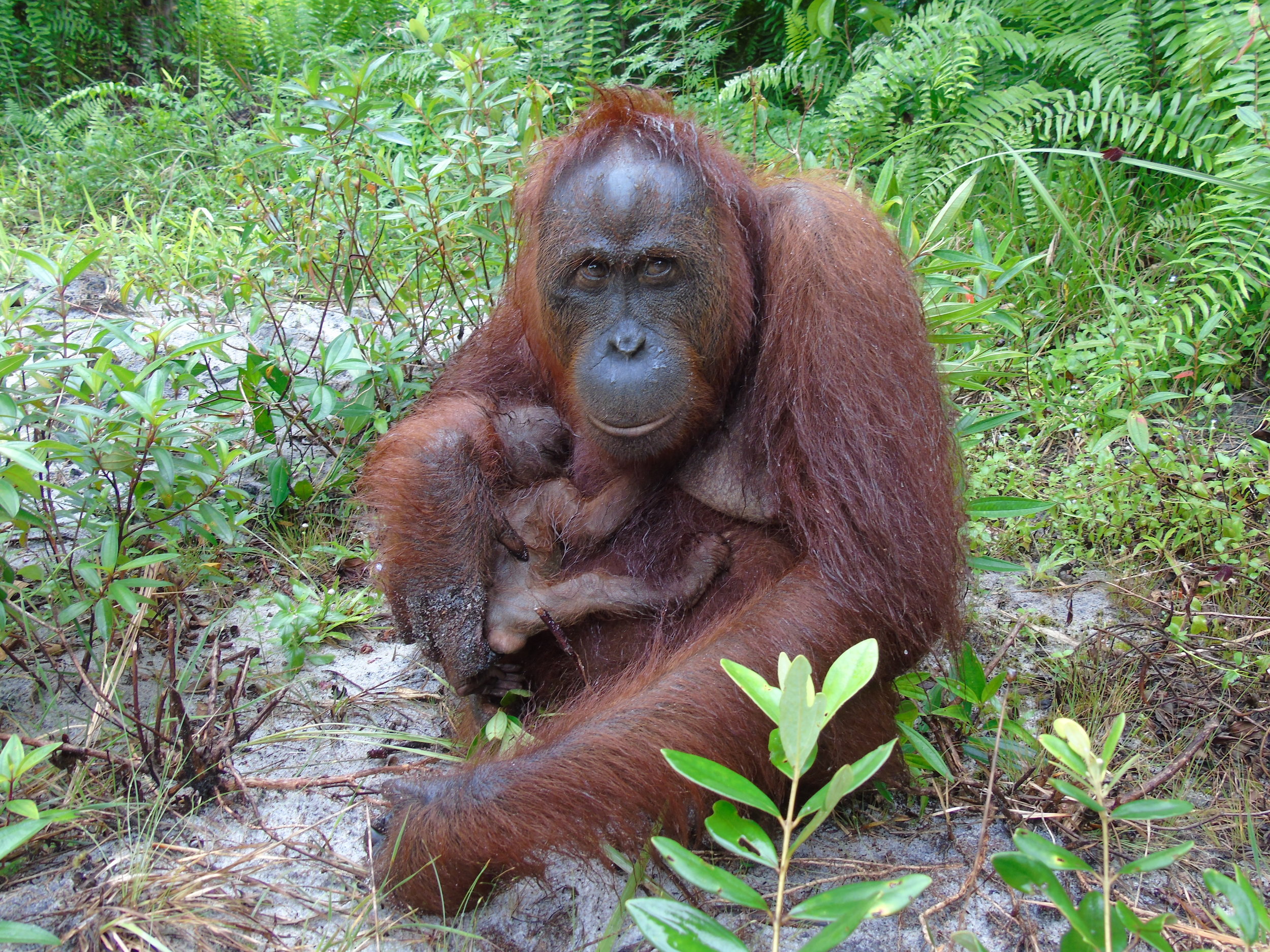
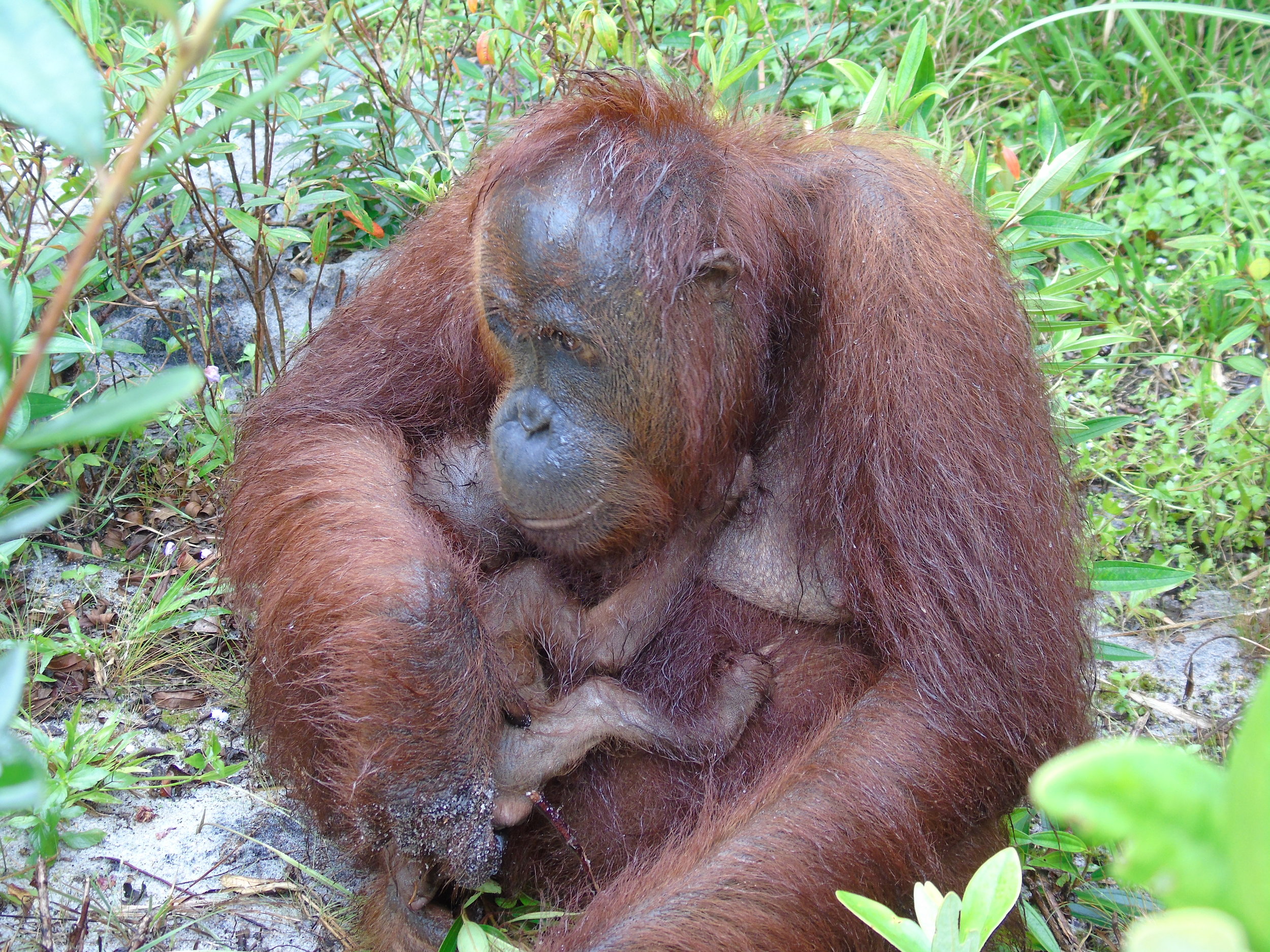
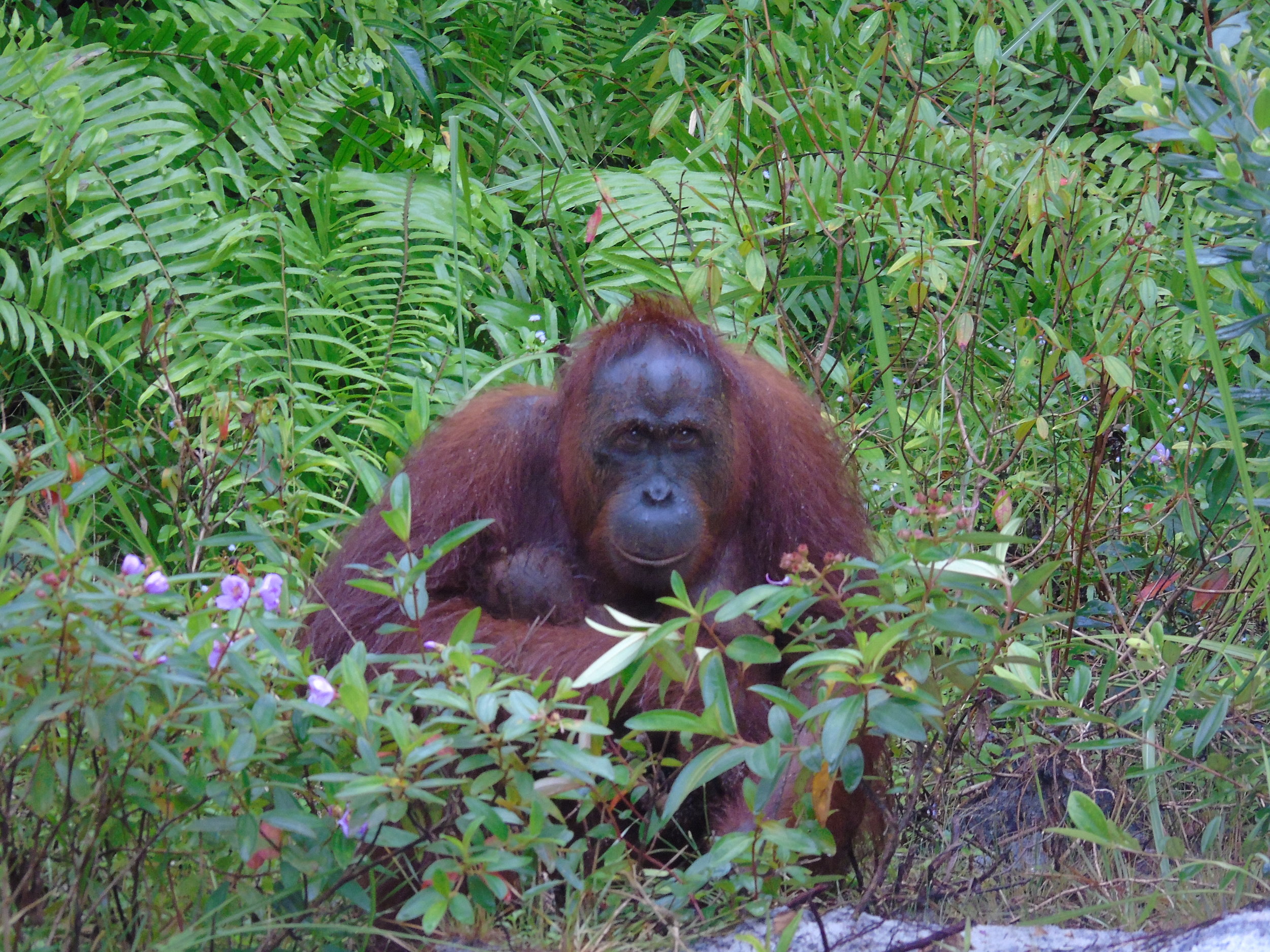
This is Mores’s third child after giving birth to Marcell and Martin in previous years- a positive indication to the health of Lamandau Wildlife Reserve for breeding orangutan mothers.
To continue the ‘M’ lineage, and as the newborn has been identified as a female, the newborn has been named Marsha. Our team hope to continue to keep an eye on their progress going forward.
Find out how you can help protect their precious habitat by becoming a Guardian of Lamadau!
Rescued and released orangutans of Lamandau Wildlife Reserve
Our vet, Dimas and programme manager, Iman, have been on their weekly visits to the orangutan release camps in the Lamandau Wildlife Reserve, Central Kalimantan, Indonesian Borneo. They check on the orphaned young orangutans and ensure the good health of the released orangutans. Their journey took longer than usual because the river levels are very low, due to lack of rain. Instead of travelling by speedboat it was completed in a shallow longboat (or klotok, as they’re called in Indonesia). Our youngest orangutans are cared for at Camp JL and include Timtom, Nyunyu, Adib, Mona (photo below) and Boy. Dimas gave them their multivitamin injection to keep them healthy but they are all well and active.
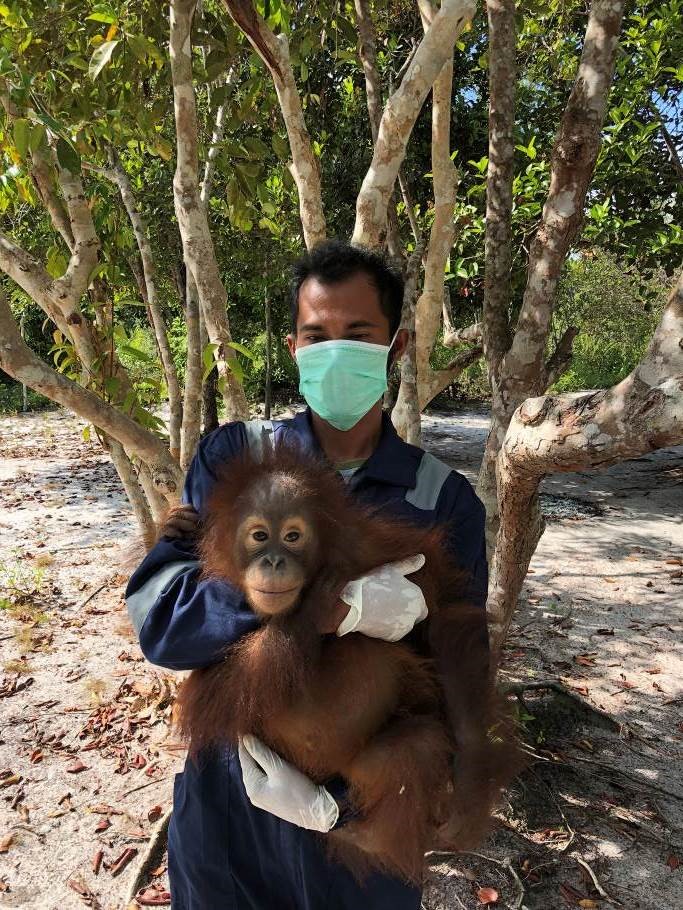
In the afternoon they continued by longboat to Gemini Camp. This is where blind orangutan Aan lives. Aan was shot and can never be returned to the wild. Her enclosure recently had new ropes (see below).
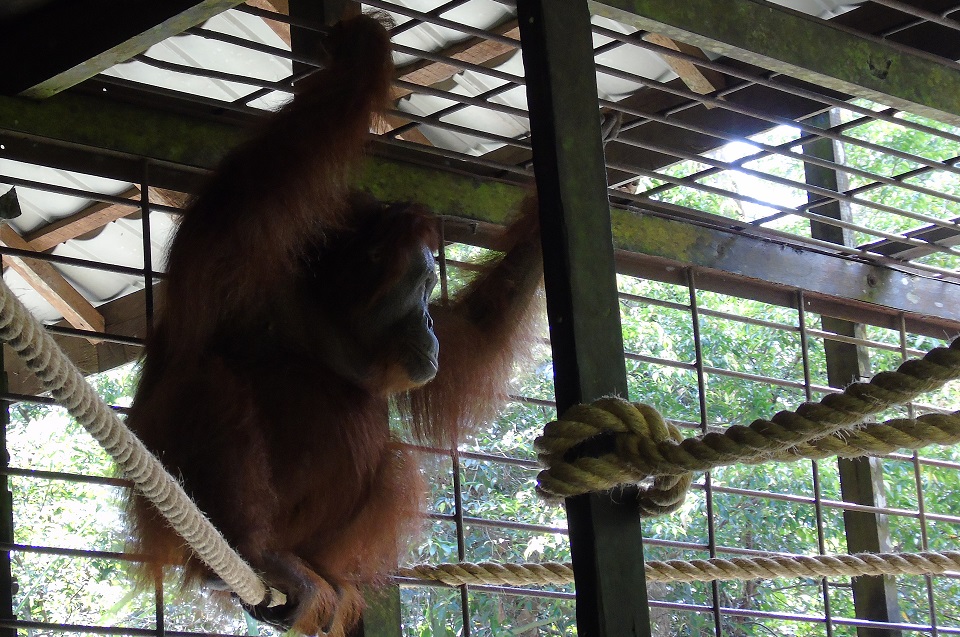
They walked from camp through the forest to the feeding site, where supplementary fruit is provided. Dominant male, Bangkal came to feeding along with female and infant orangutans; Ilik and Izzy; Hola and Happy; Ebony and Ekon (photos below); and Passion and Paris. Max was also seen with her newborn infant, now named Monti and they seemed well.
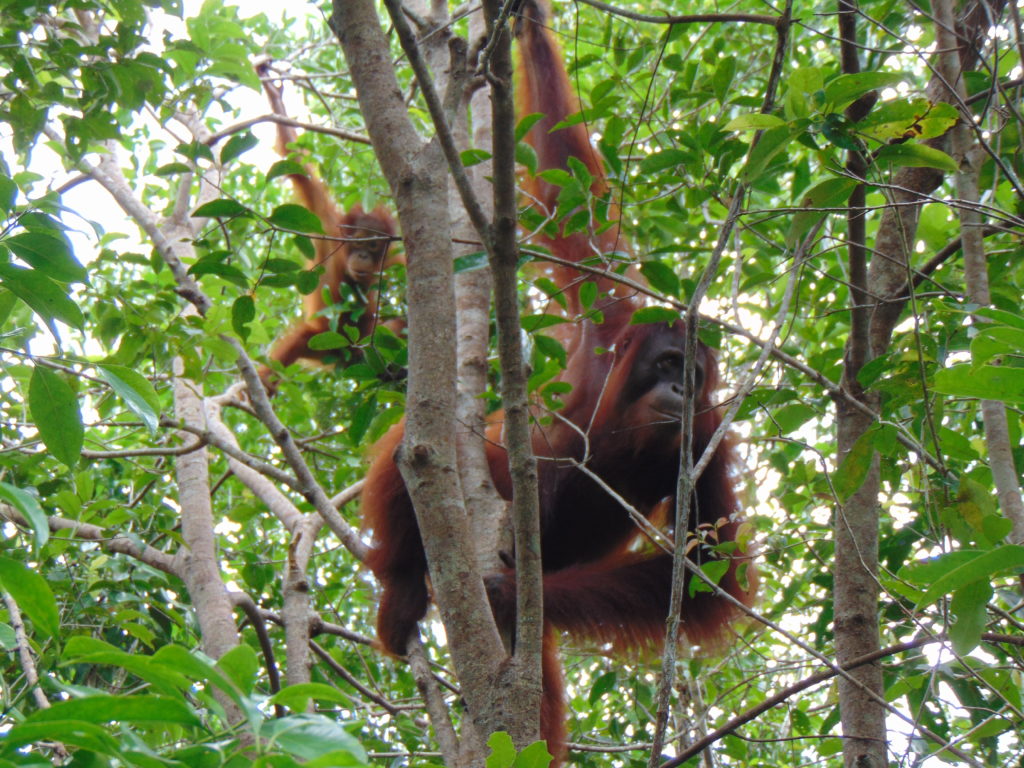
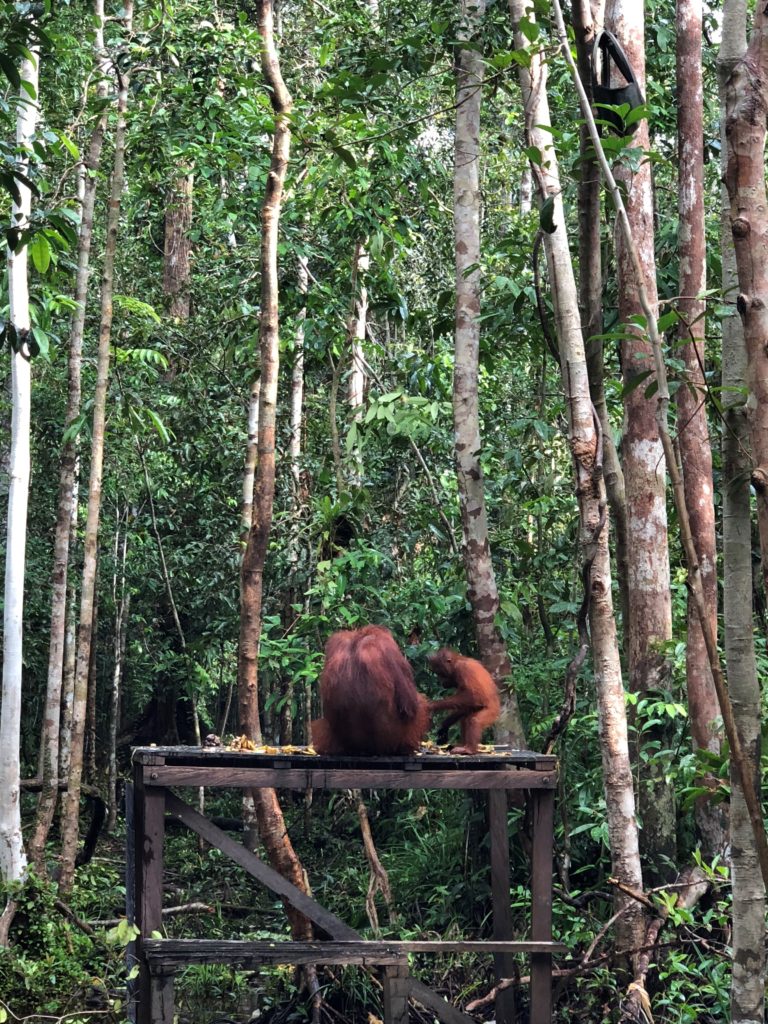
A few days later they went to Camp Buluh, to check on orphan orangutans Okto and Syifa. Okto had injured one of his fingers a few weeks ago but after receiving treatment the inflammation has reduced and is healing well.

Both Okto and Syifa very active and enjoy playing together. Okto was given a final anti-inflammatory injection and both orangutans received their multivitamins.
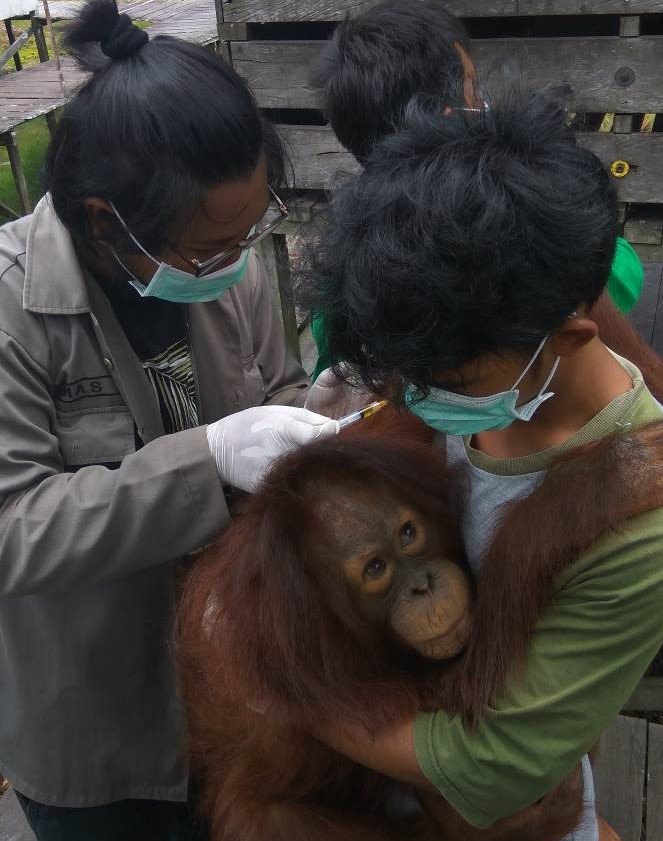
Conditions are very dry at present and so our guard post staff are vigilant and on alert for fires. All the guard posts are equipment with fire-fighting gear and our staff are trained enabling them to respond quickly and effectively to extinguish fires.
Please help us to keep forests standing and orangutans in the wild. You can support our work by donating or adopting Okto or Mona.
Baby orangutan born
We are delighted to announce the arrival of another baby orangutan born into the protected Lamandau Wildlife Reserve, Indonesian Borneo. Our staff believe the orangutan was born on 26th January. Mother, Holahonolulu (Hola for short) was seen with her new infant at Camp Gemini's feeding site. We think the father is likely to be Bangkal, the dominant male, as they were seen mating on several occasions.
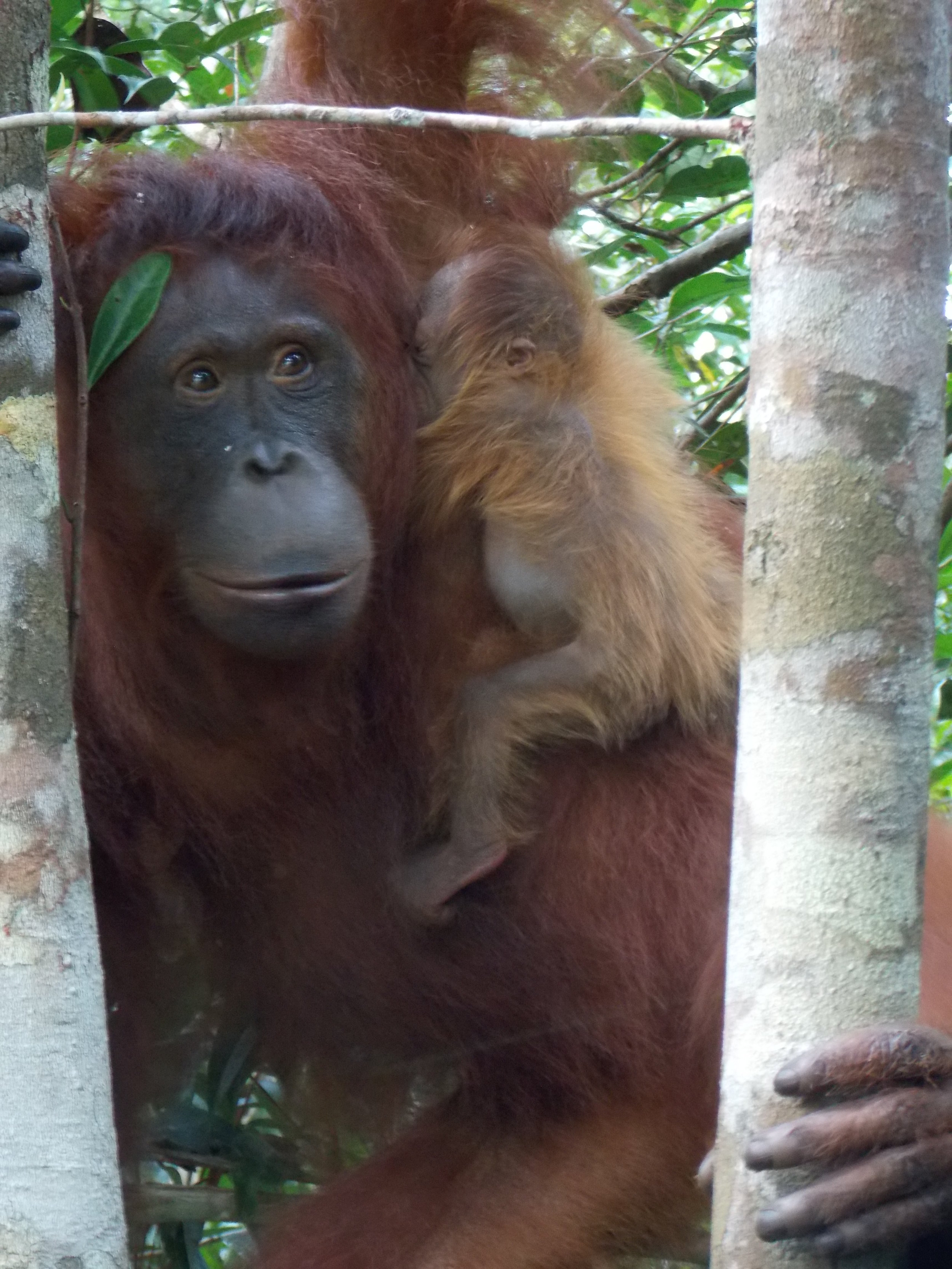
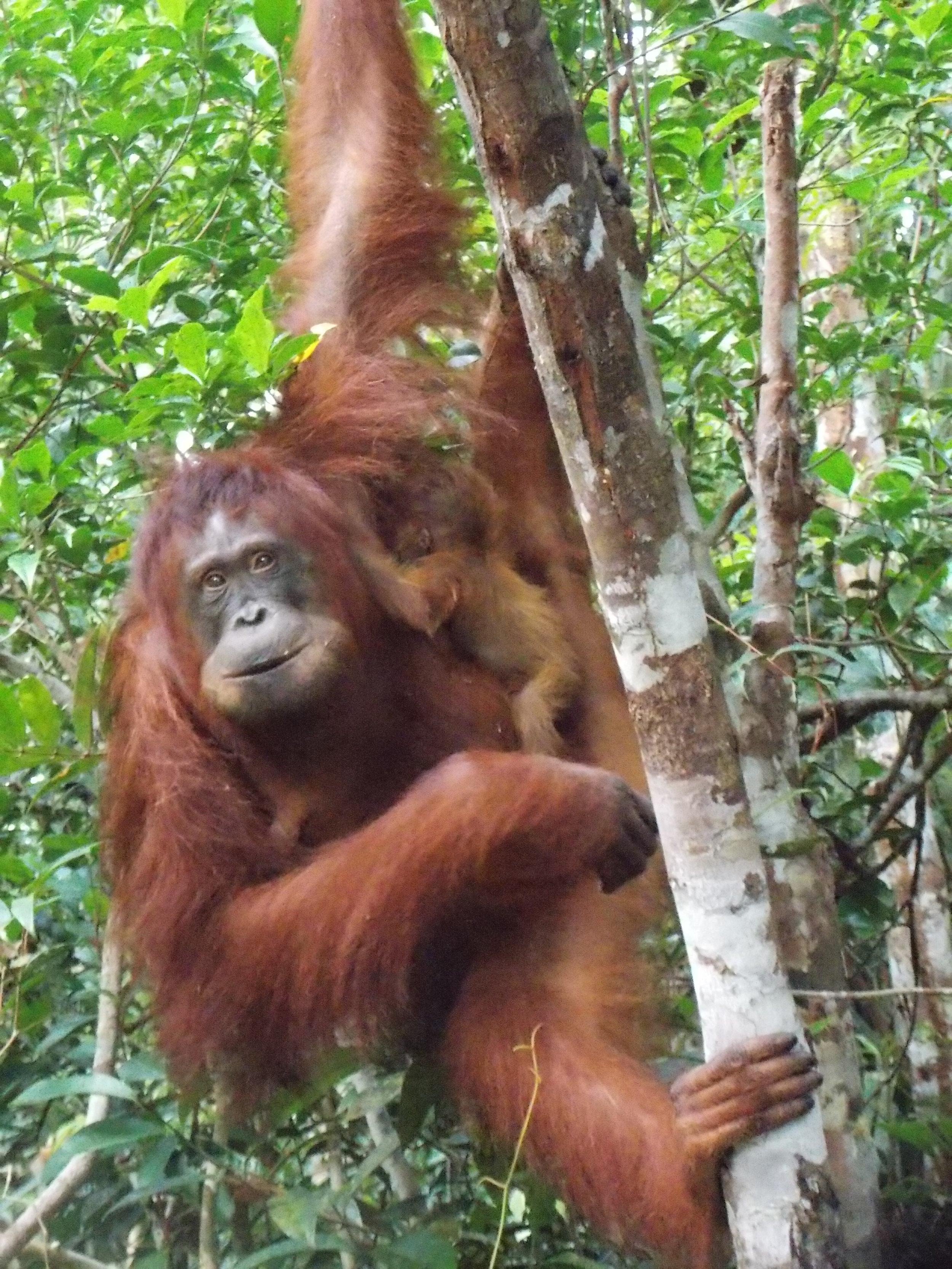
Both Hola and her baby looked healthy. Hola ate a lot of fruit, the extra energy needed for milk production. As yet, our staff could not tell what sex the baby was.
Hola was born in the wild in December 2004 and her mother was Huber. Huber was rehabilitated by OFI and was released into the Lamandau Wildlife Reserve in December 1999, but she has since passed away.
Our staff have yet to name Hola's new baby so we thought we would ask for your help. Send us your suggestions (leave a comment), it must start with an H and be a unisex name. We will decide on Monday 5th February.
Help us to ensure these orangutans remain in the wild and that their forest home stays protected. Click here to donate today!
Orangutan Foundation - a future for orangutans, forests & people
Vet's first orangutan rescue
The Orangutan Foundation is delighted to welcome Dimas Yuzrifar as its new vet, replacing Dr Steven, who has now returned to Bali. Being "thrown in at the deep end" is certainly how the first week has been for Dr Dimas! Last weekend we received reports of a wild orangutan in village forest. This was passed onto the government agency for wildlife, BKSDA SKW II Pangkalan Bun.
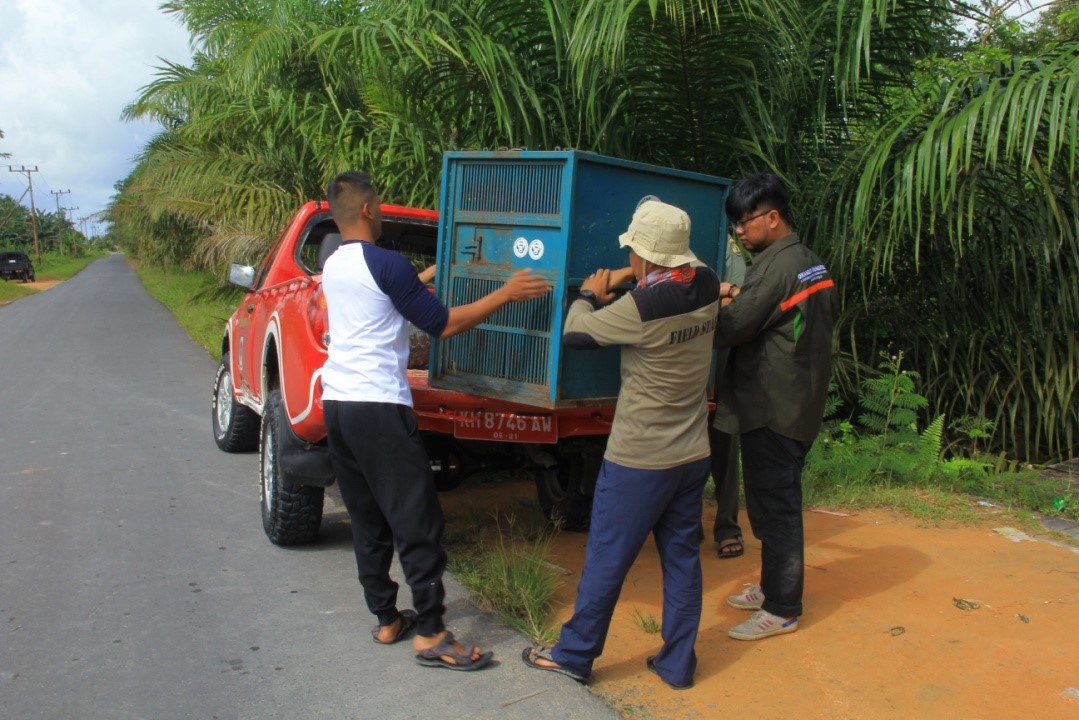
The orangutan was found close to oil palm, banana and rubber plantations owned by local residents. The villagers feared the orangutan would damage their crops and so BKSDA decided, in this case, to capture and move (translocate) the orangutan, to avoid any conflict arising. Dr Dimas managed to anesthetize the orangutan. After being caught the orangutan was identified as female with an estimated weight of around 25 kg. The next day after checking the orangutan was well and active she was released into the safety of the protected Lamandau Willdife Reserve.
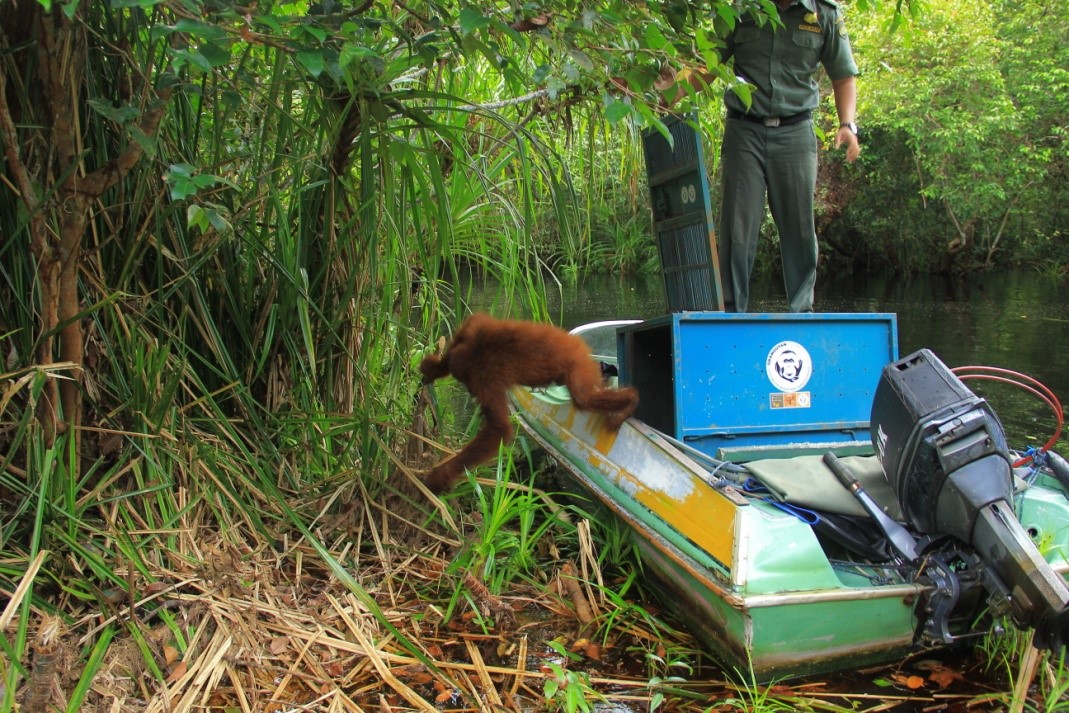
Watch this clip to see how quickly the orangutan leaves the transport cage and disappears into the forest.
After the busy weekend with the translocation, Dr Dimas also spent time meeting and checking up on the young orangutans in our release camps. Here's a clip of young Satria playing in his night-time enclosure.
Wonder what the next week will have in store?
Thank you for supporting our work.
Donate to help us keep the Lamandau Wildlife Reserve and its precious orangutans and wildlife protected. Click here to donate - thank you.
Orphaned infant orangutans "at home" in the forest.
“When Adib, an orphaned infant orangutan, arrived at the end of October he was afraid of climbing in the trees. Within two months he is much more confident and now seems very at home.” said Azhari Purbatrapsila, manager of the Orangutan Foundation’s Release Programme. In this blogpost, Azhari shares his observations of some of the characters in soft-release.
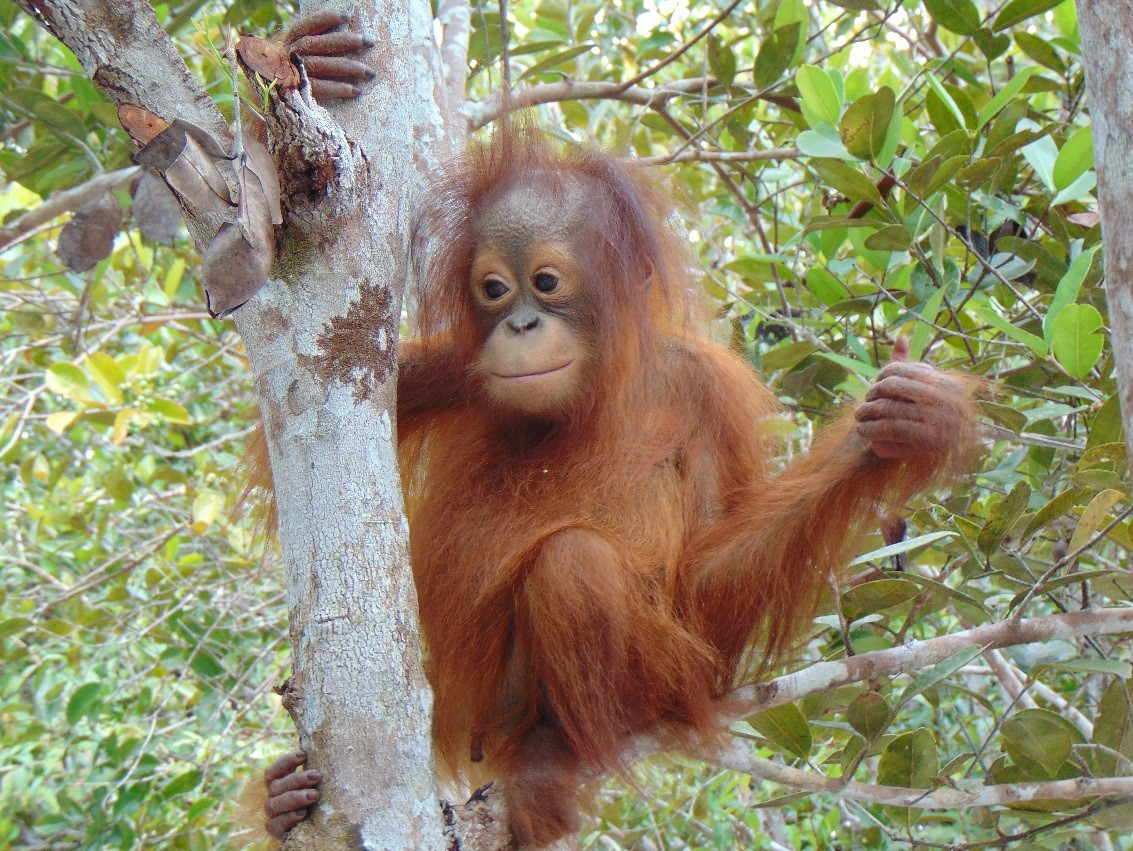
The Orangutan Foundation run 5 release camps within the Lamandau Wildlife Reserve, Indonesian Borneo. Here, infant orphaned orangutans undergo a soft-release process, allowing them time to learn the skills to survive in the wild.
Adib: He can climb high to the tree top. Sometime he plays with orangutans Mona and Timtom but he mainly loves to play alone since the other orangutans are bigger and stronger than him. (Watch Adib's first climb)


Mona: Mona is making great progress. Just after she moved out from her sleeping enclosure, Mona climbed a tree and straight away started bending the branches. She made a tiny nest. Not long after the nest had broken with the branches springing back to their original position. She still doesn’t have enough strength to break the branches and make a firm nest. But still, this is a really good improvement from her!
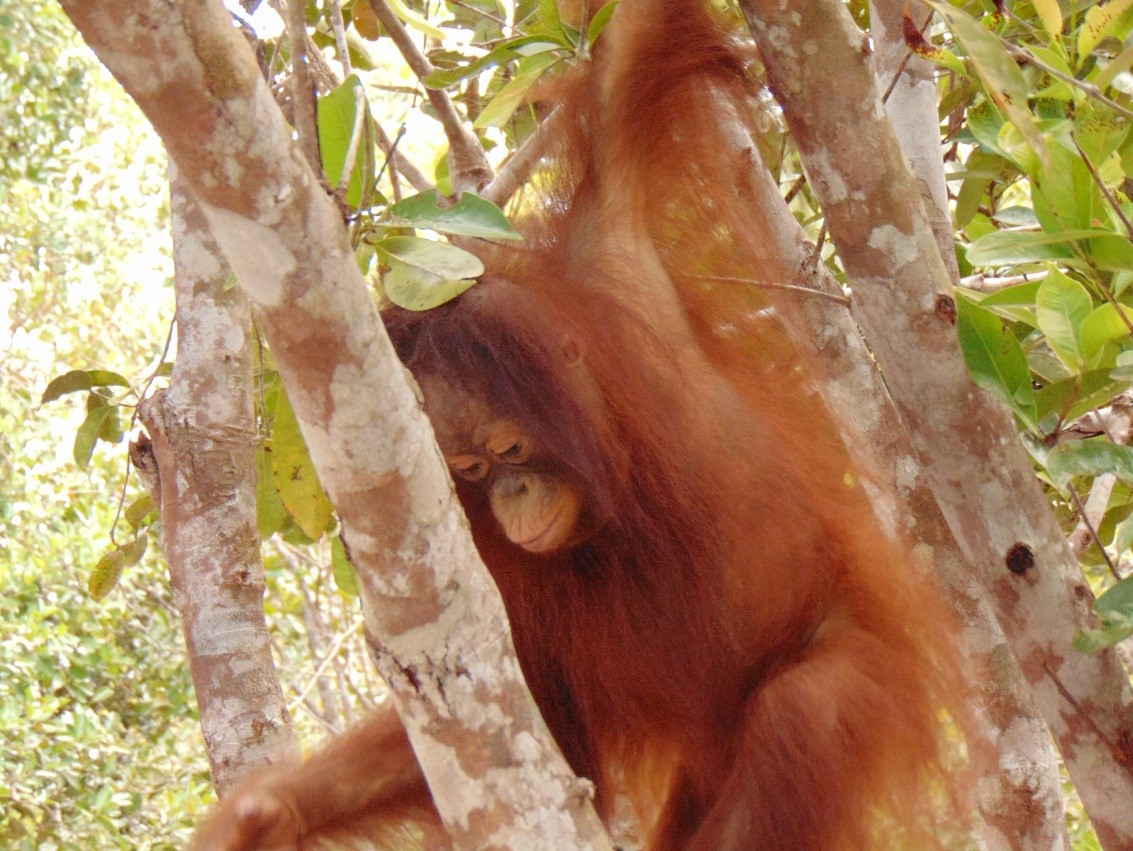
Timtom: Like Adib, Timtom likes to play alone but she will play will Mona or Adib. She plays in the lower tree branches, even though she can climb to the top. Being cautious, she never ventures far.

Boy & Nyunyu: Boy and Nyunyu are two of the biggest and strongest of the orphaned orangutans, which explains why they are best buddies. They are very active and spend almost all their time playing together so much so that it is often difficult to get them back in at night! An encouraging sign though.
Please donate to support our work helping these orangutans return to the wild. Thank you to all our members and supporters for their ongoing support.
Two orangutans born within two months
 We have seen two orangutan births in less than two months. Why is this significant and a reason to celebrate? Orangutans are critically endangered, a recent report found that orangutan populations on Borneo have declined by 25% over the last 10 years. A shocking statistic. However, in the Lamandau Wildlife Reserve, orangutan numbers are increasing. Many orangutans now living in this protected forest reserve were rescued as their forest home was destroyed around them or they were orphaned because their mothers had been killed. With our supporter’s generous help we have been able to give them a second chance to live in the wild and they are thriving.
We have seen two orangutan births in less than two months. Why is this significant and a reason to celebrate? Orangutans are critically endangered, a recent report found that orangutan populations on Borneo have declined by 25% over the last 10 years. A shocking statistic. However, in the Lamandau Wildlife Reserve, orangutan numbers are increasing. Many orangutans now living in this protected forest reserve were rescued as their forest home was destroyed around them or they were orphaned because their mothers had been killed. With our supporter’s generous help we have been able to give them a second chance to live in the wild and they are thriving.

Volvo was born to rescued mother orangutan, Vania, at the end of May and our most recent newborn is Dublin (named after Dublin Zoo’s recent visit), born to ex-captive mother orangutan, Dedek.
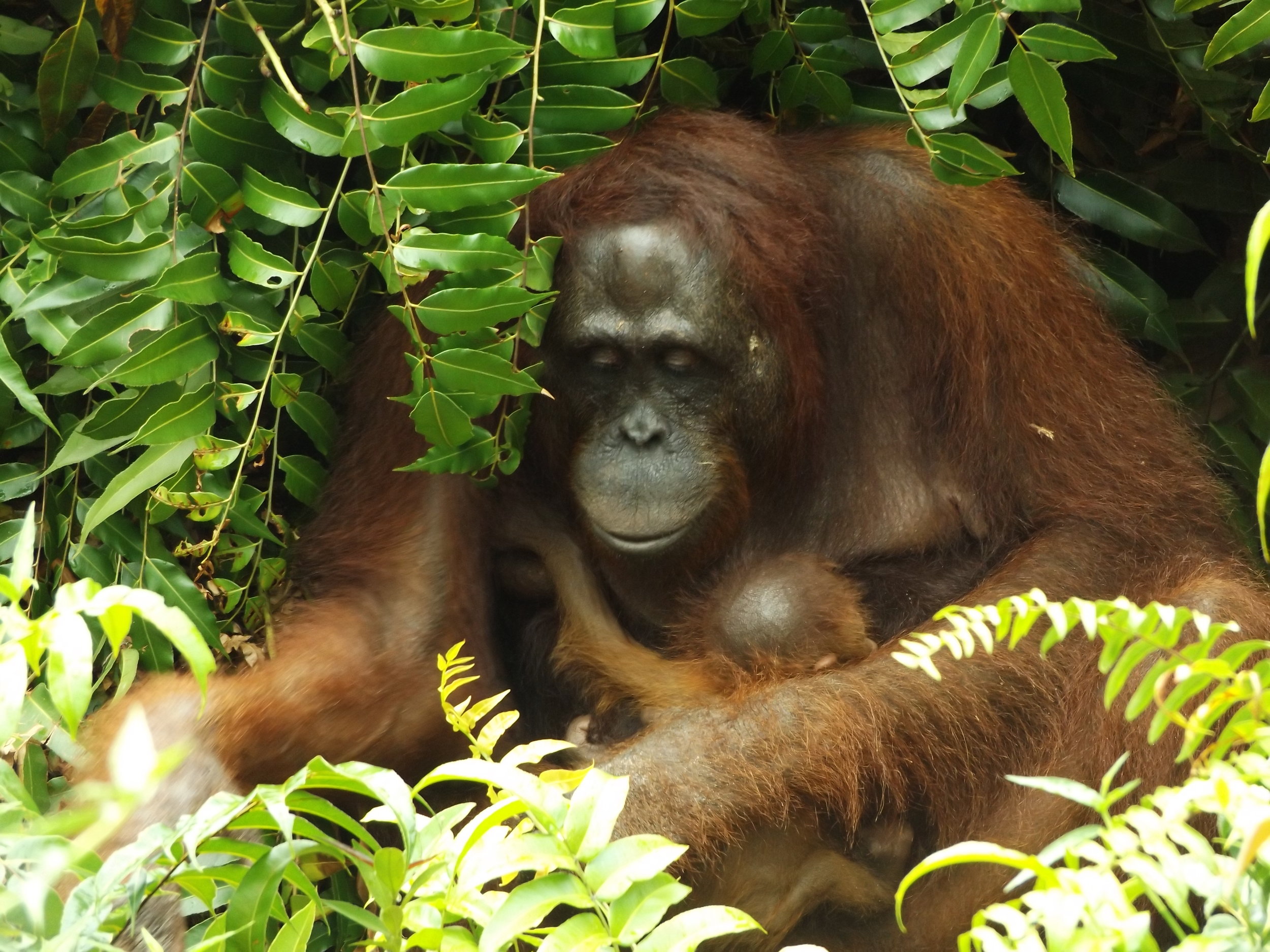
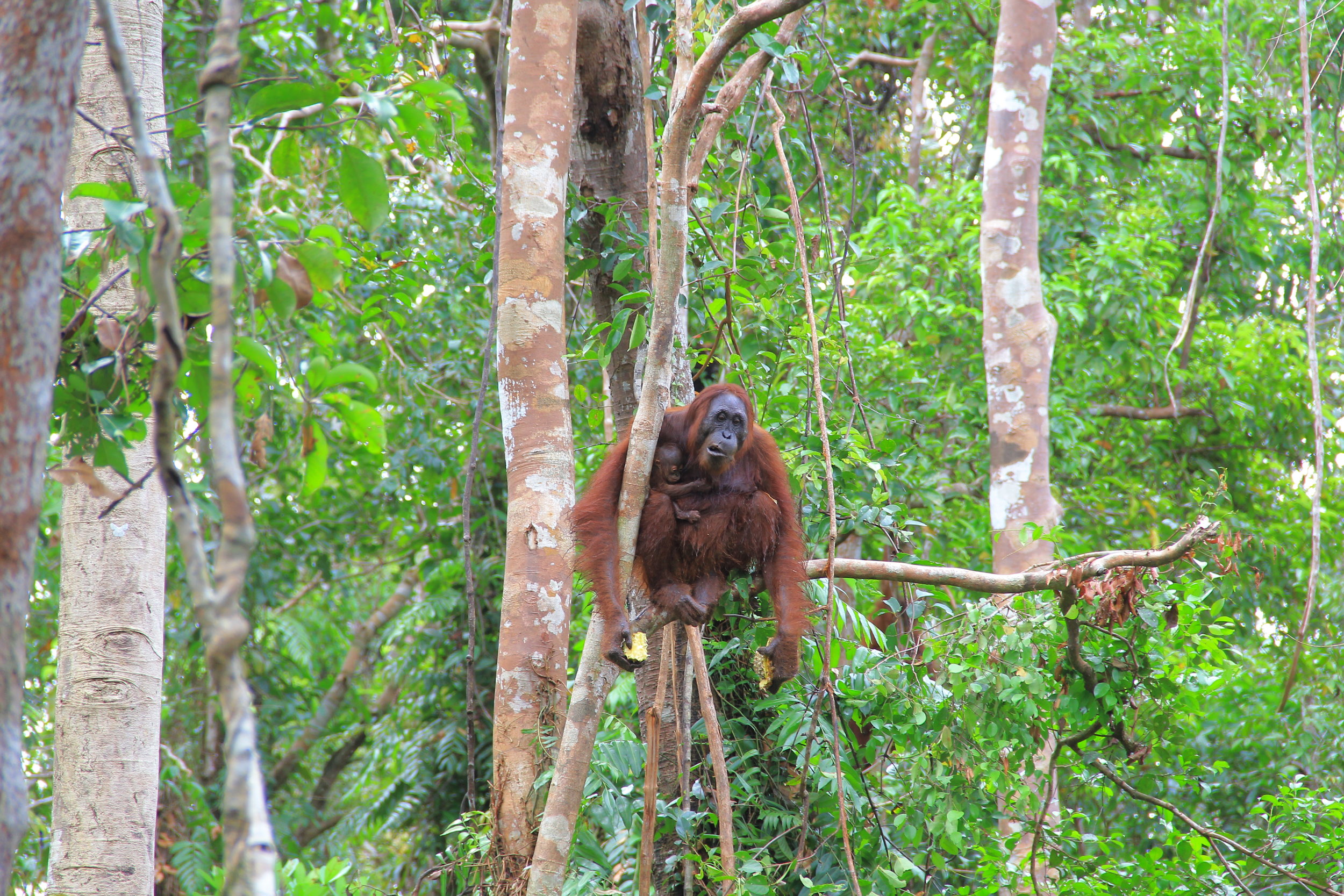
Help us to protect this wildlife reserve and keep the orangutans and other wildlife that live here safe and free. Become a Guardian of Lamandau Wildlife Reserve.
Thank you for your ongoing support,
Orangutan Foundation
Orangutan, Bumi, Rescued With Bullet Wounds
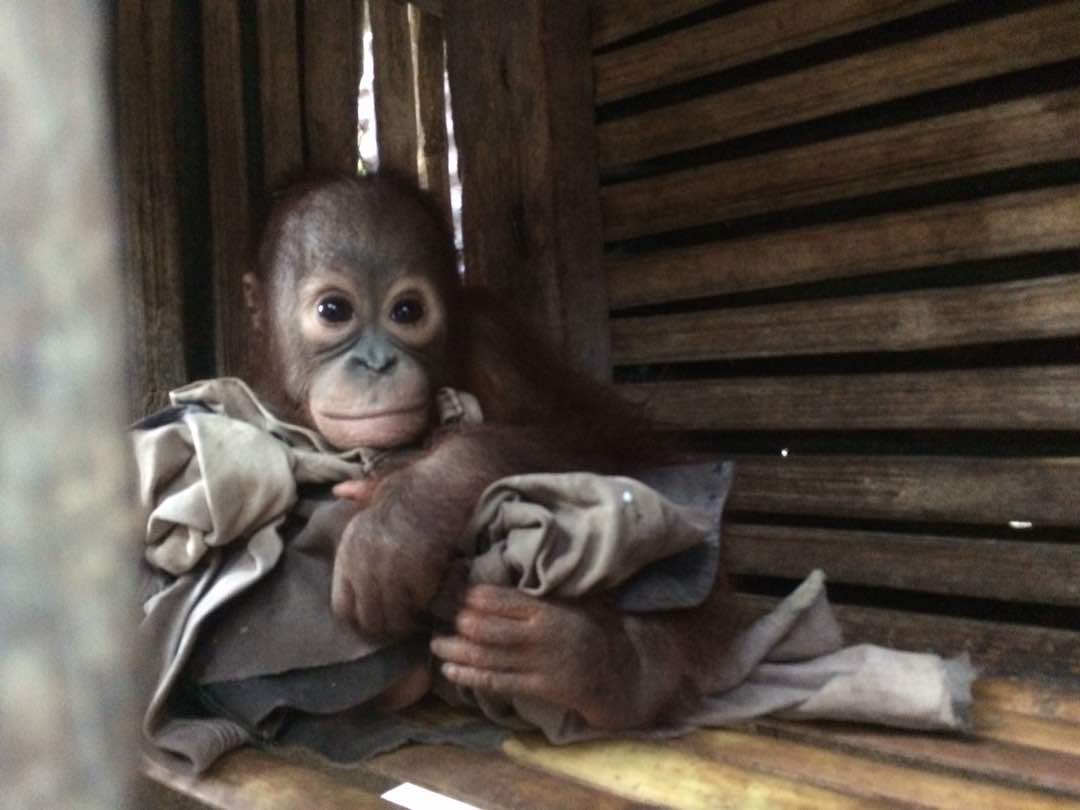 On 19th June 2017, BKSDA informed our field staff that they had just confiscated an orangutan from people who had been keeping it as a pet in a nearby village. This orangutan was entrusted into the care of the Orangutan Foundation.
On 19th June 2017, BKSDA informed our field staff that they had just confiscated an orangutan from people who had been keeping it as a pet in a nearby village. This orangutan was entrusted into the care of the Orangutan Foundation.
The male orangutan was named Bumi (which means Earth in English) and was estimated to be about 3 and a half years old.

Our vet checked Bumi’s health and overall condition, which proved quite difficult as he wouldn’t stay still! He was anesthetized as it was vital that he was looked over thoroughly for any injuries or illness.
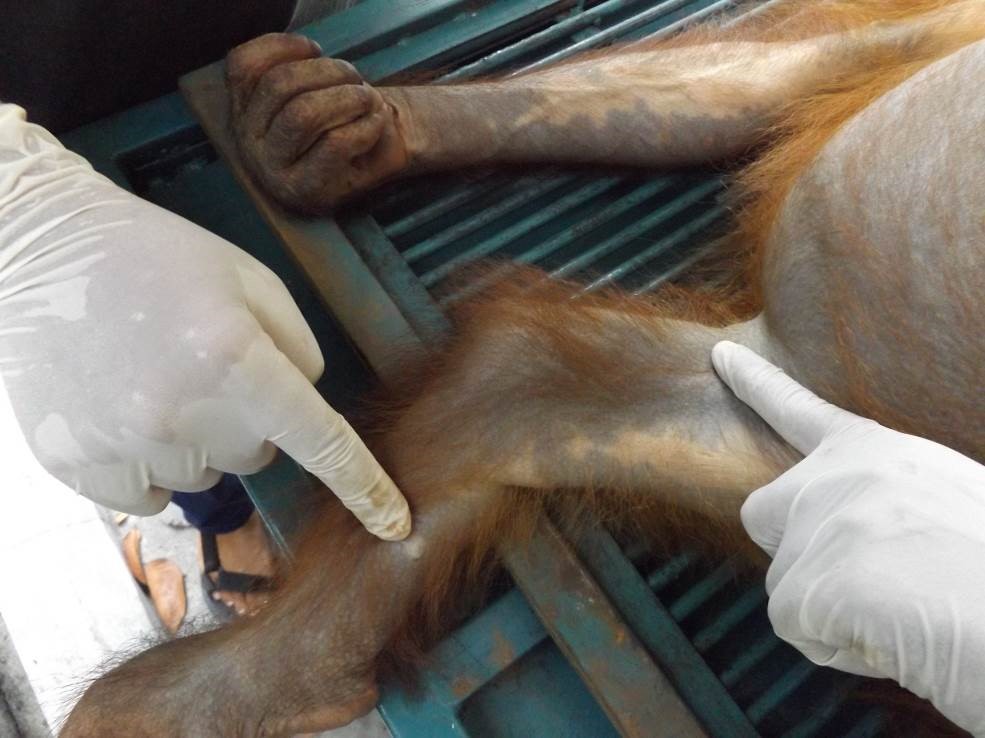
During the assessment, bullets were discovered in Bumi’s body. We are uncertain of the origin of the bullets, but it is likely a result of people attempting to shoot the mother to obtain the infant.
This, tragically, is how most orangutans enter our Soft-Release Programme.

In total, 7 bullets were removed from Bumi’s body. Bumi was given health supplements, and once he’d recovered from the operation, he was ready to join our Soft-Release Programme.
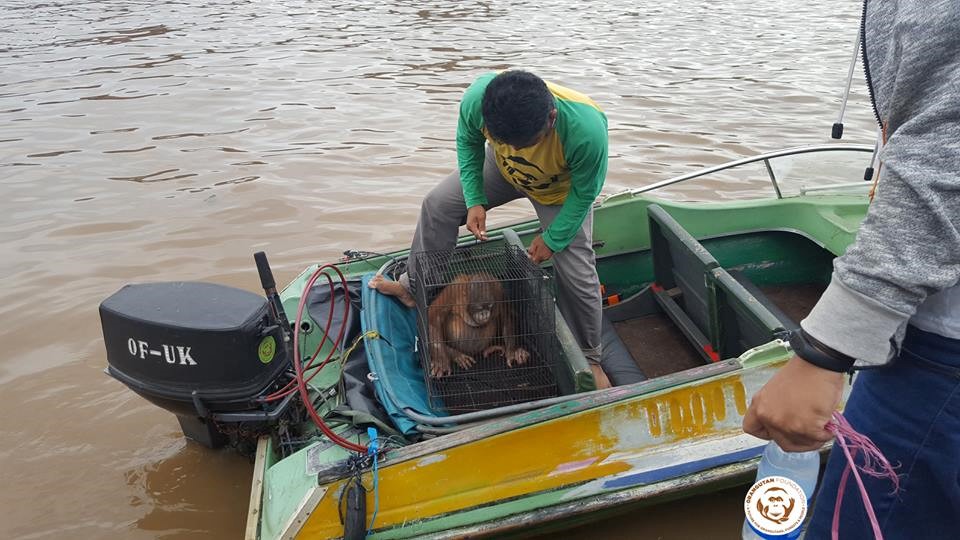
Bumi was taken to Camp Rasak in the Lamandau Wildlife Reserve, Indonesian Borneo. Here he will be cared for alongside Endut, an orangutan of a similar age also rescued from being kept as a pet last March.
Staff report that since settling in Bumi appears to have a good appetite and has already displayed nest-making skills.

Watch this clip to see Bumi showing off his skills:
Please DONATE today to support the progress of Bumi and the other orangutans currently in our Soft-Release Programme.
Orangutan Foundation Welcomes New Arrival
In September 2015, Central Kalimantan was hit by major forest fires. Many orangutans needed rescuing from areas of burning forest and community land.
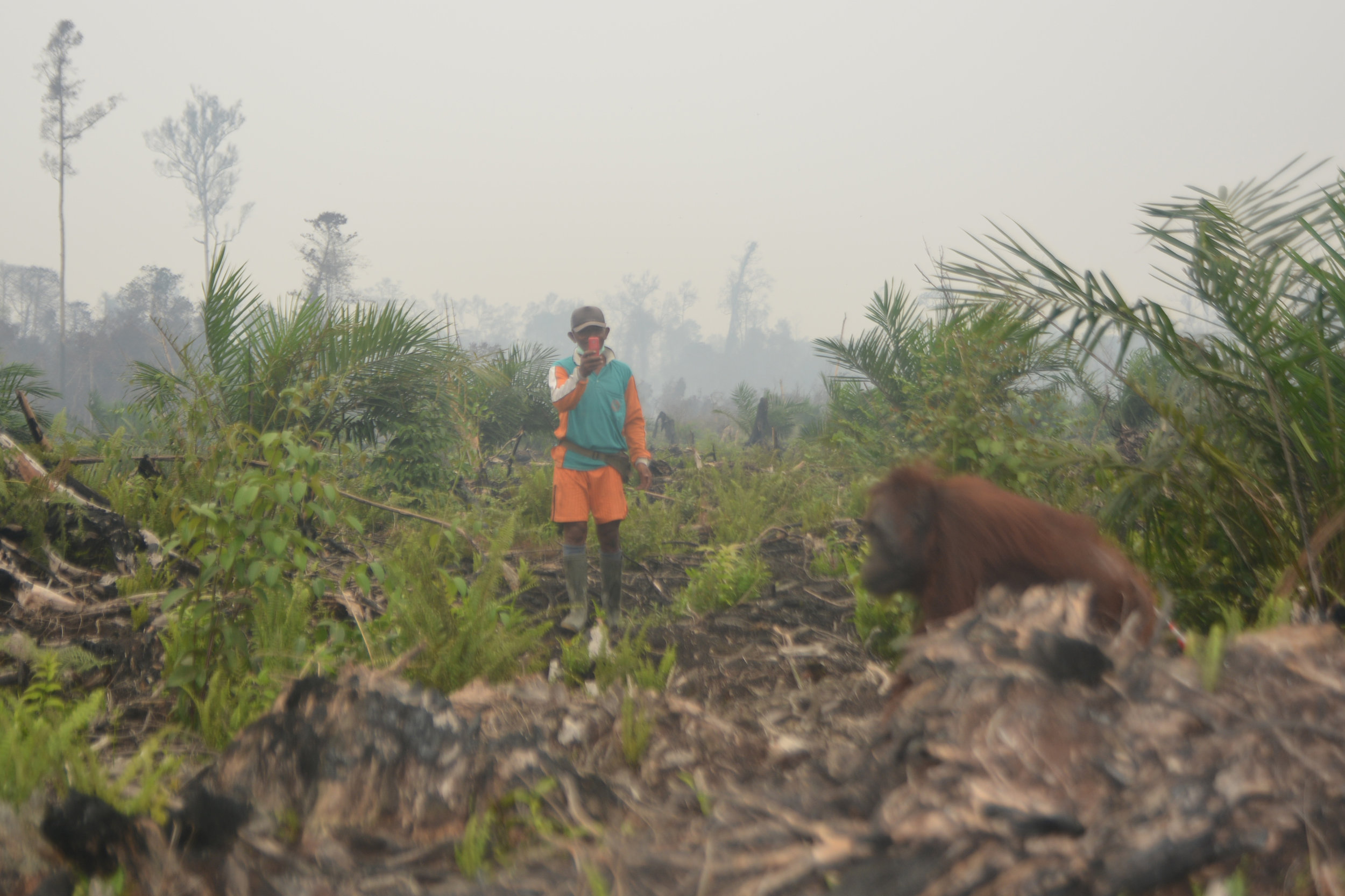
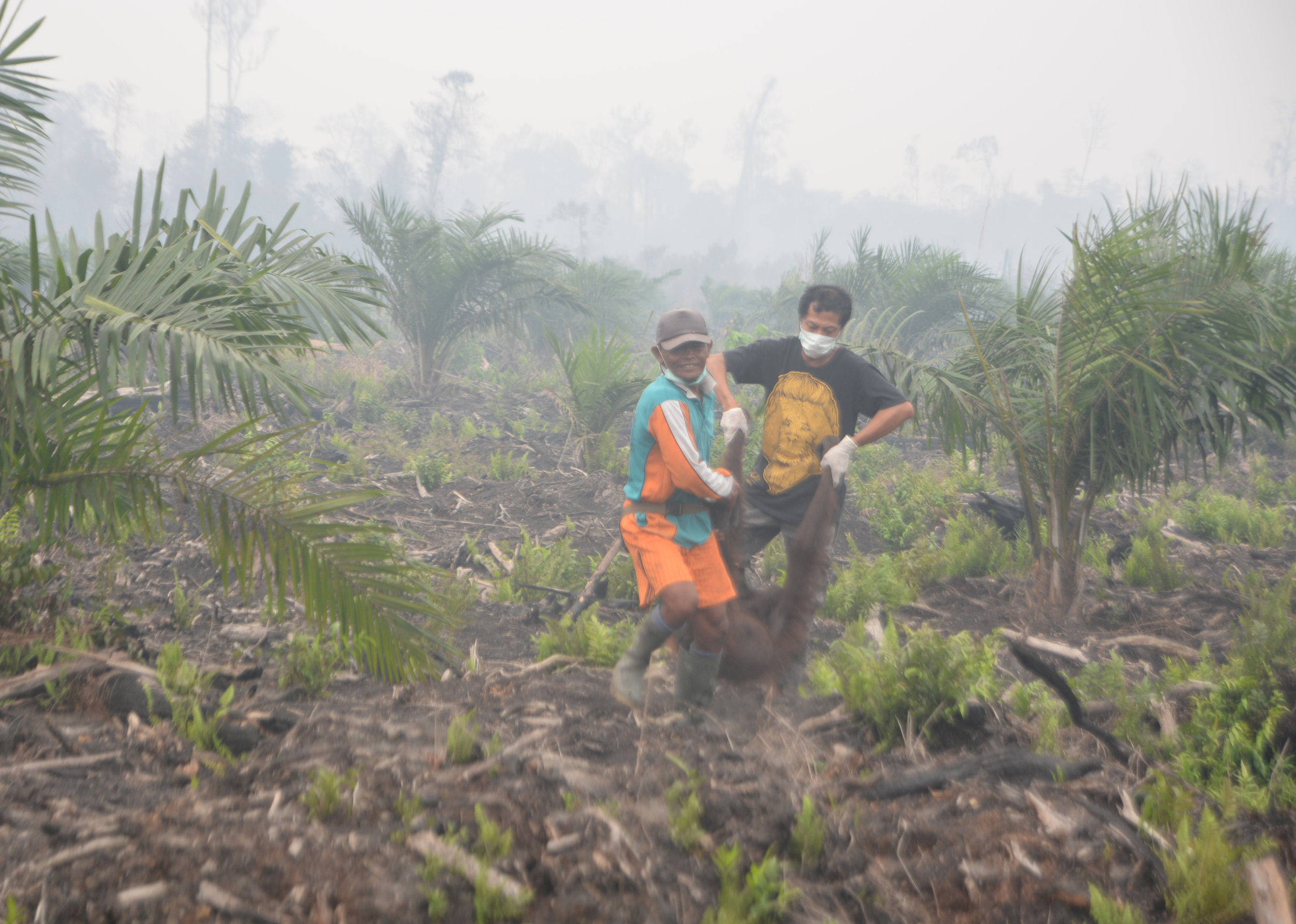
One such orangutan was Vania, a 29 year old female orangutan, named after a student who was doing research on orangutans in the Lamandau Wildlife Reserve at the time. Vania and her 6 year old offspring (named Venty) were rescued from an oil palm plantation and released by Camp Buluh in the Lamandau Wildlife Reserve.

Both are now in good health and are still frequently seen in the area. As shared yesterday, field staff have informed us that Vania gave birth on 25th May to an infant they have named Volvo.

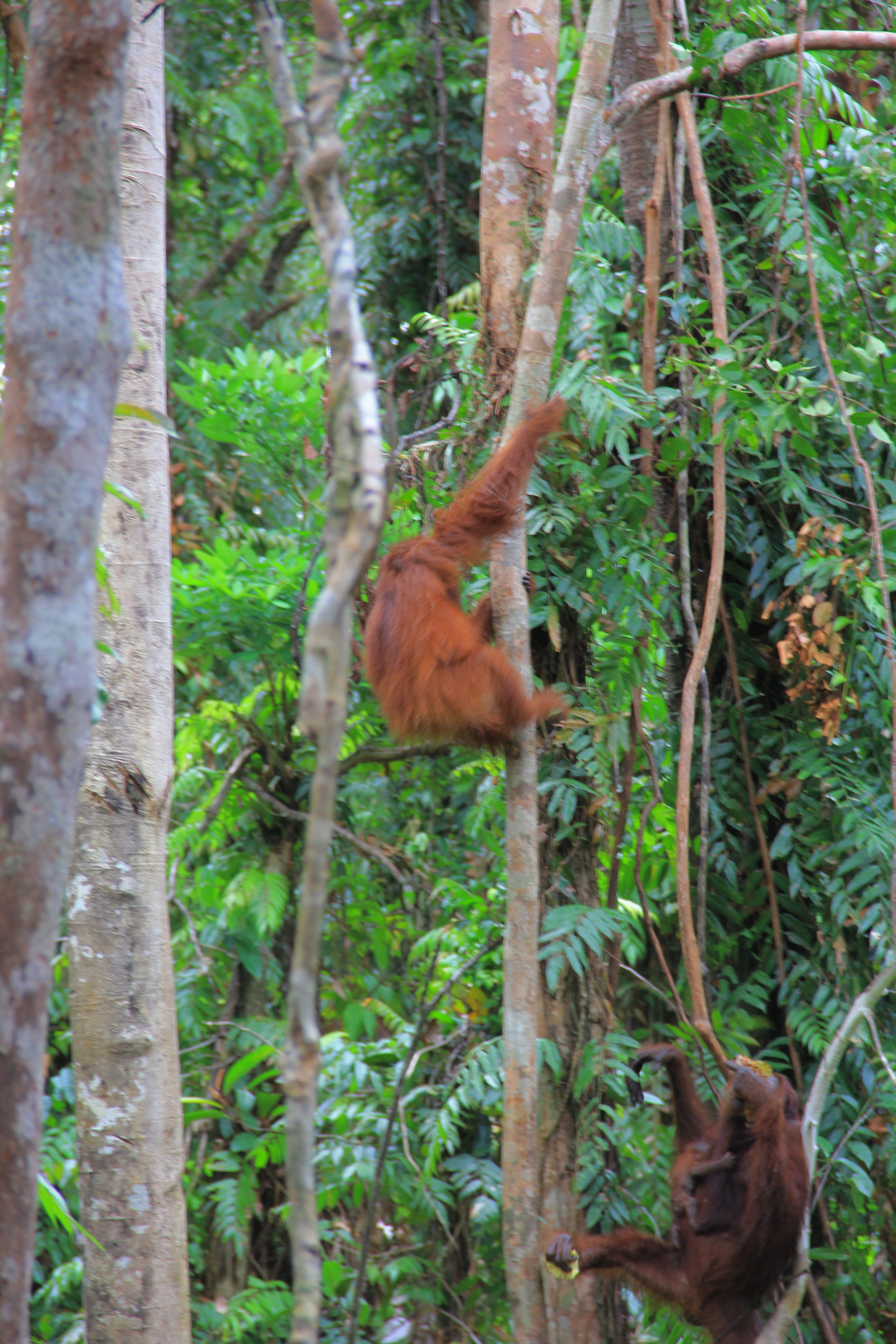
Vania has been seen around camp since the birth to show off her new arrival.
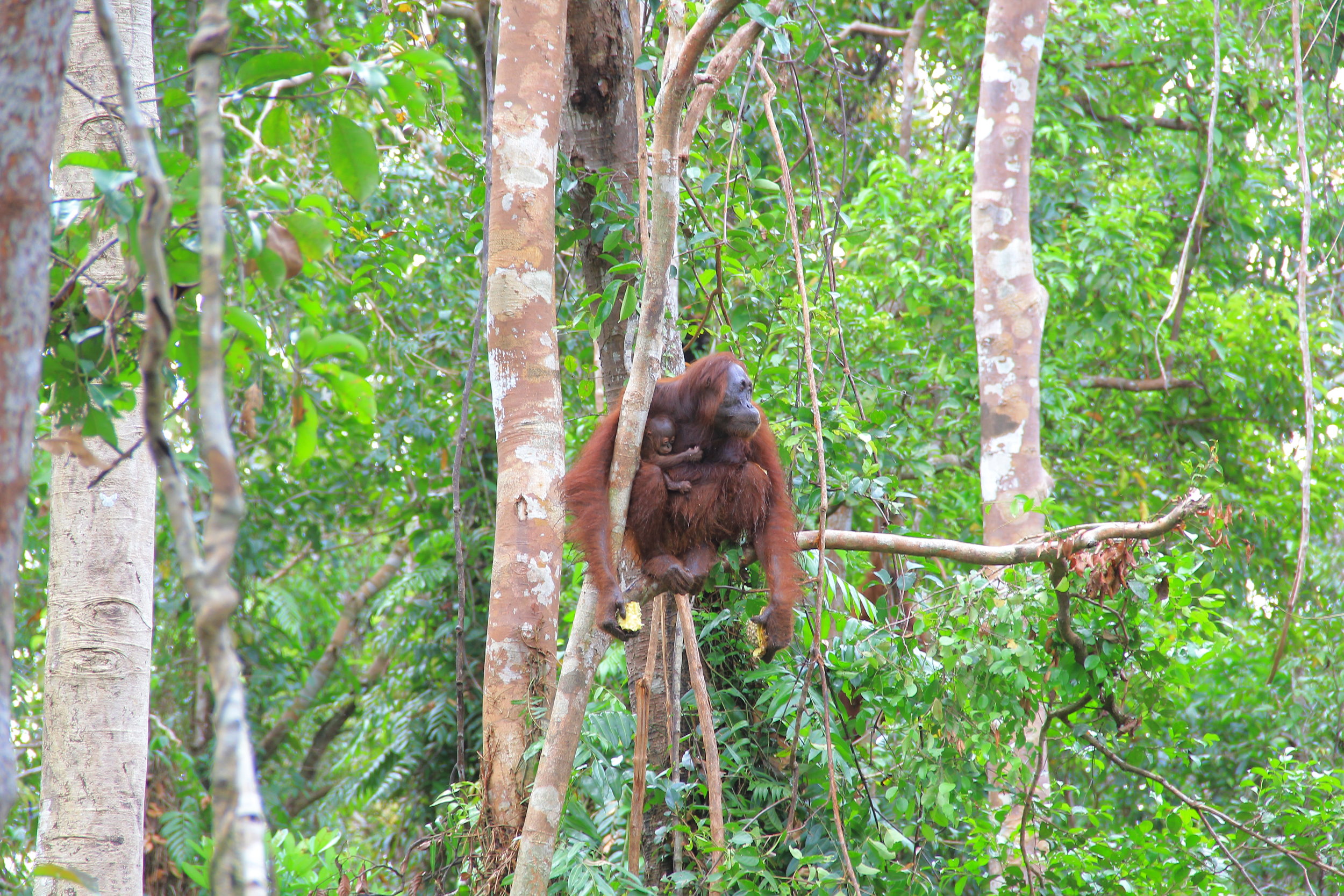
Welcome Volvo to the Lamandau Wildlife Reserve!
Would you like to play an active part in the protection of Volvo's tropical forest home?
Become a guardian of Lamandau and help us ensure a future for orangutans, forests and people. Click here for more information.
Rainforest: Live 2017
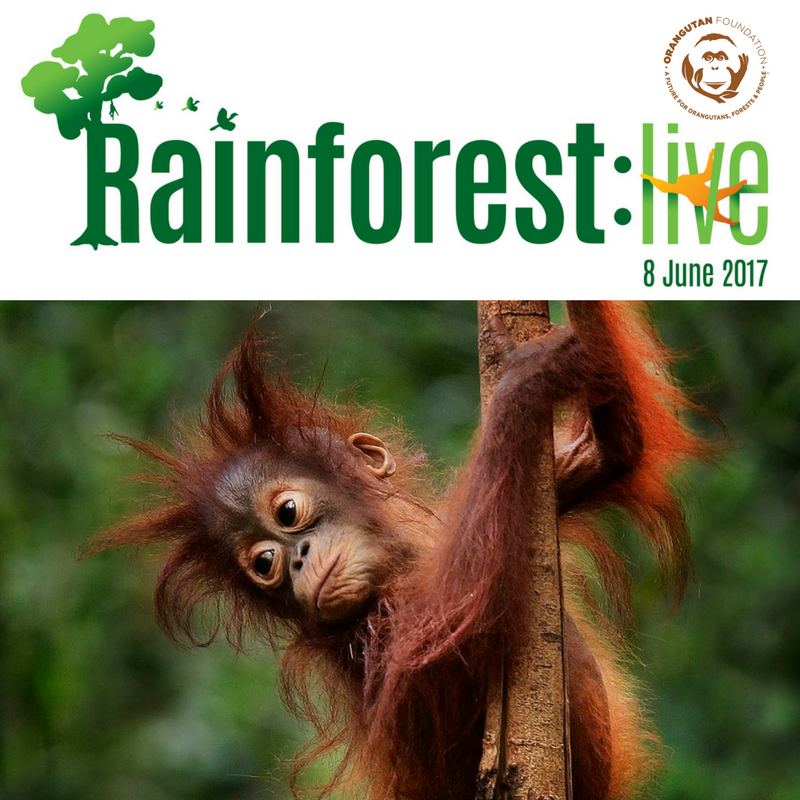 This year we again take part in Rainforest: Live, a global social media event set up by Borneo Nature Foundation, with more than 50 organisations taking part.
This year we again take part in Rainforest: Live, a global social media event set up by Borneo Nature Foundation, with more than 50 organisations taking part.
Organisations will share a glimpse of rainforest life on social media to inspire people to take action and help protect these critical habitats.
WHAT TO WATCH OUT FOR: Rare and wonderful wildlife sightings direct from rainforests all around the world! Here's a clip we posted last year to give you a taste of what is to come:
You can learn more about the event here.
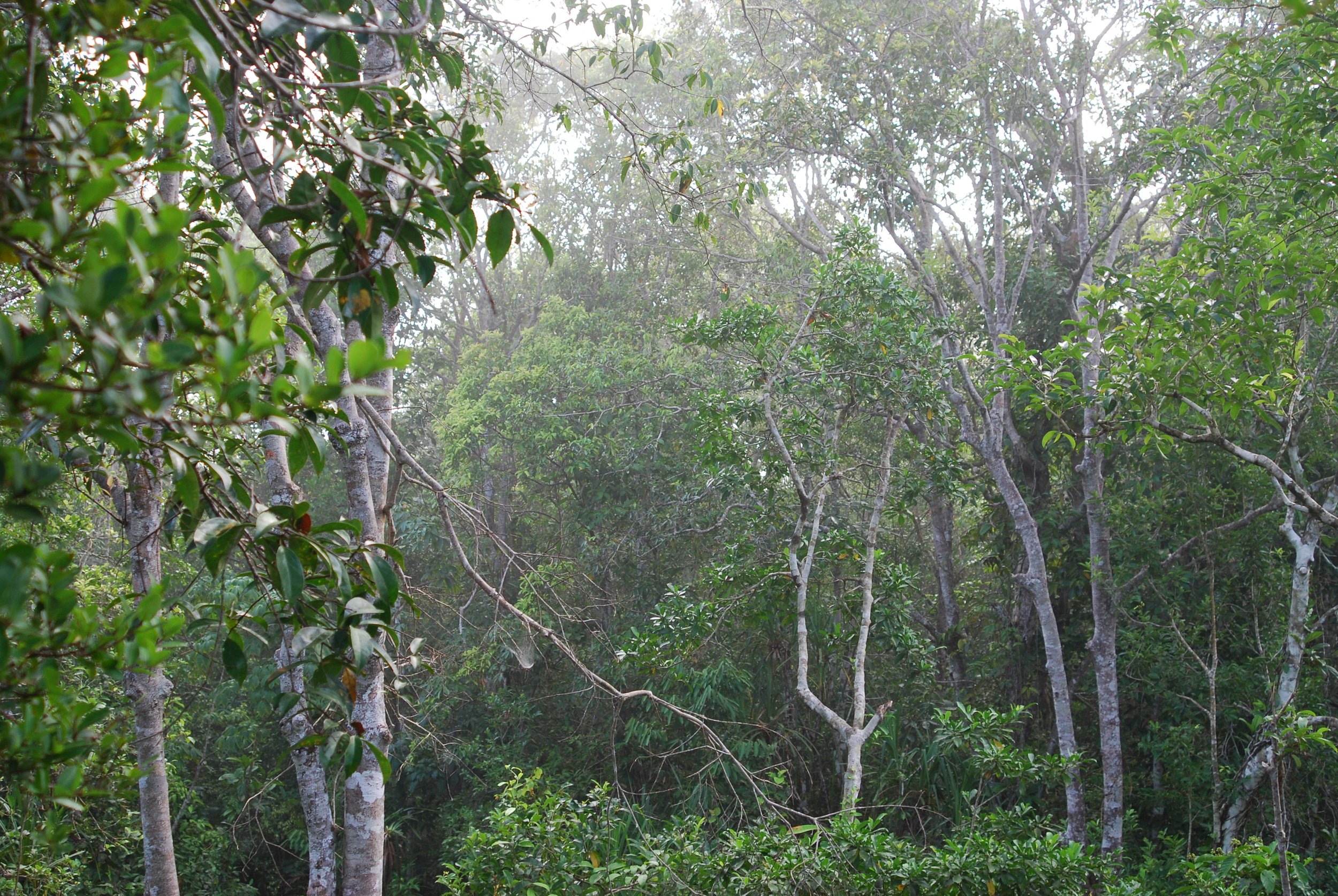
Rainforests once covered as much as 12% of the earth's landmass. They now only cover 5%, largely a result of human activity. Help us to protect the world's remaining rainforests, estimated to be home to as much as half of all species of flora and fauna found on earth, including the magnificent orangutan.
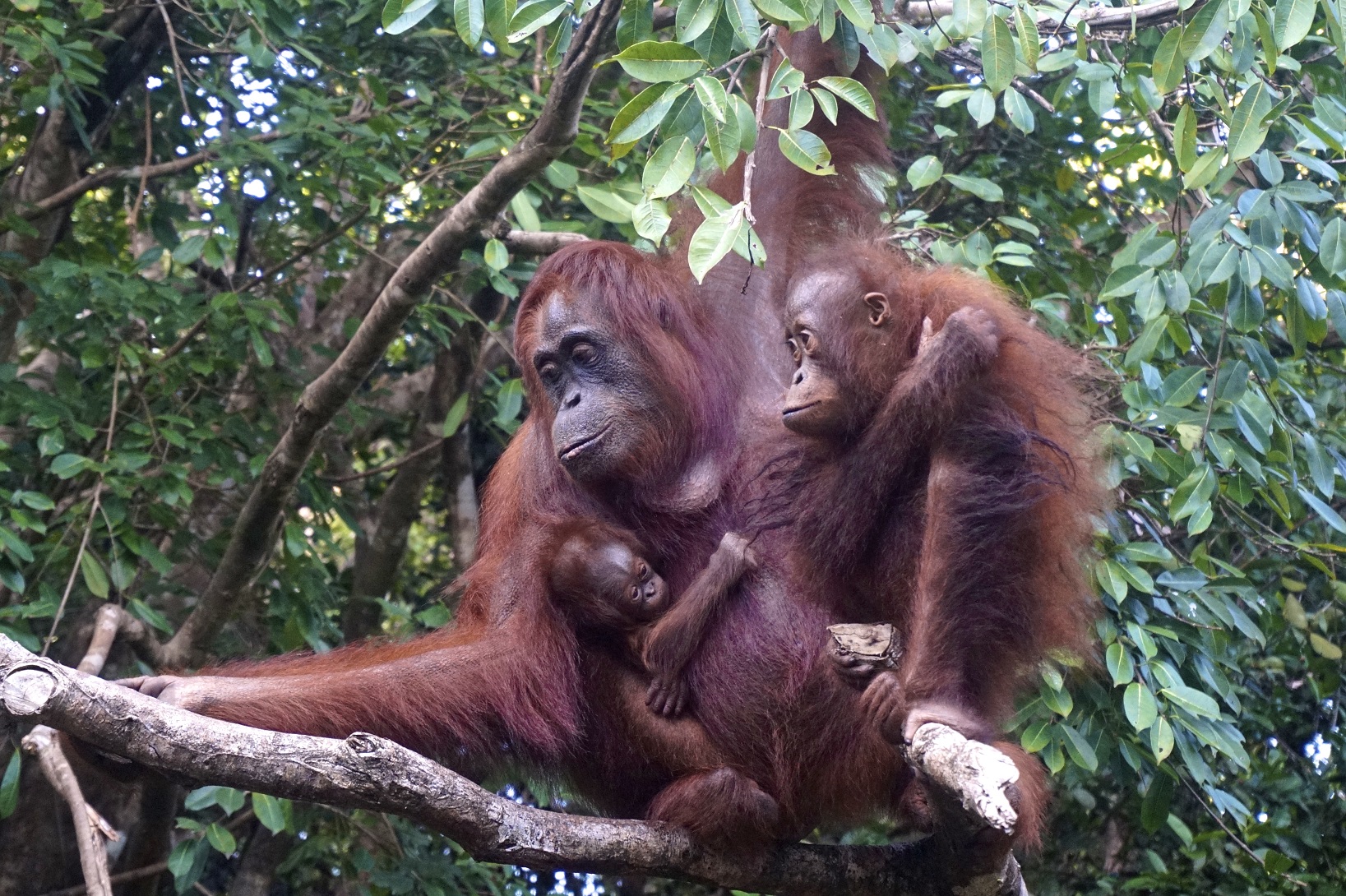
Join us tomorrow on Facebook, Twitter, Instagram, Tumblr and Pinterest and please show your support for rainforest conservation by getting involved – follow the hashtag #RainforestLive and share, like, retweet and comment!
Meet Our Soft-Release Orangutans - Part 3
In this blog entry we focus on Camp Rasak, where orangutans in the final stage of the soft-release programme before their release into the wild are monitored. The Lamandau Wildlife Reserve in Indonesian Borneo is a protected reintroduction site, where rescued orangutans can be released safely.
From this Reserve we run our Soft-Release Programme for rescued orangutans too young to return to this wild. Watch this short clip to find out how this programme equips these orangutans for a life in the forest:
Reintroduction Camps
There are 5 Camps located in Lamandau:

Depending on the age and development of the orangutan they are placed into one of the camps which is best suited for their needs. Camp staff monitor all rescued orangutans.
Currently we have 10 orangutans within our soft-release programme.
Meet the orangutans being cared for at Camp Rasak…
Endut
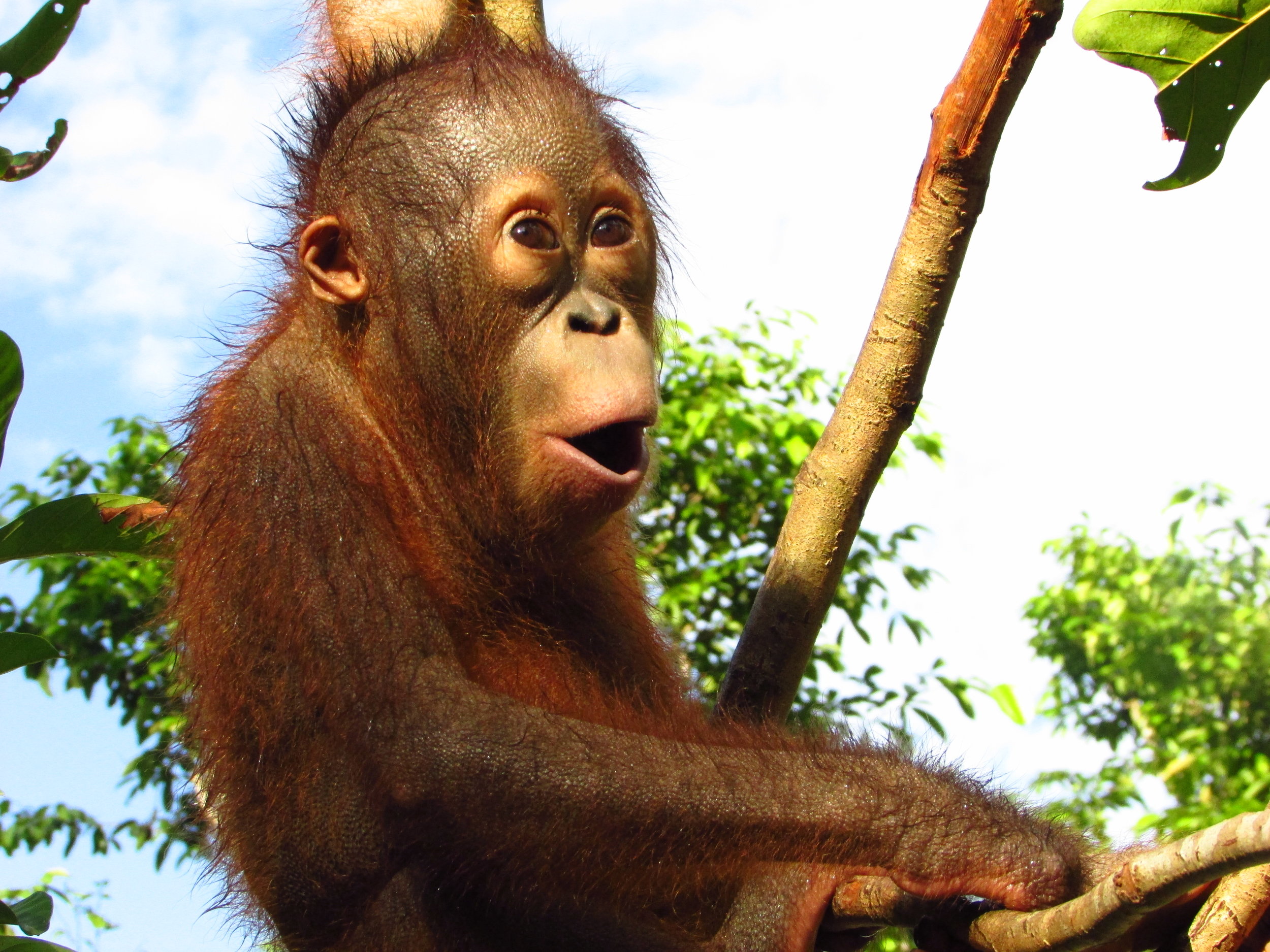
Endut is a 3 year old male who was rescued last March, named after his rather round belly. Endut is improving his climbing skills and has become much braver in the past couple of months, but is still has a way to go in order to be ready for release.
Ketty
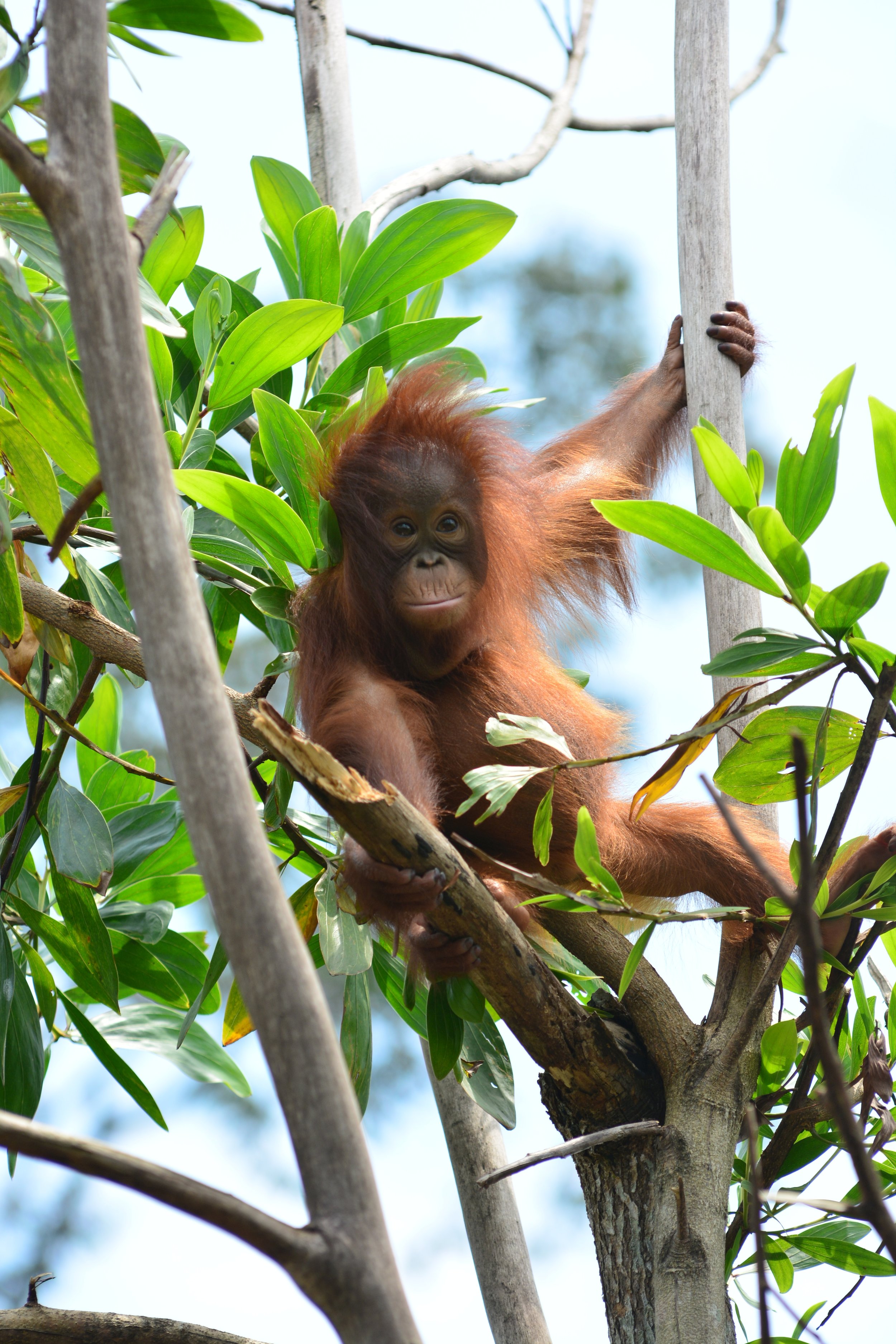
Daughter of Korin, a reintroduced orangutan who inhabited the forest around Camp Gemini. Korin sadly disappeared in 2013 and Ketty was found alone. Since joining the Programme Ketty has come along in leaps and bounds, or should we say, climbs and swings!
At 5 years of age,she's always displayed skills more advanced than the orangutans being cared for alongside her, which is likely a result of spending some time with her mother in her early years.
Jessica
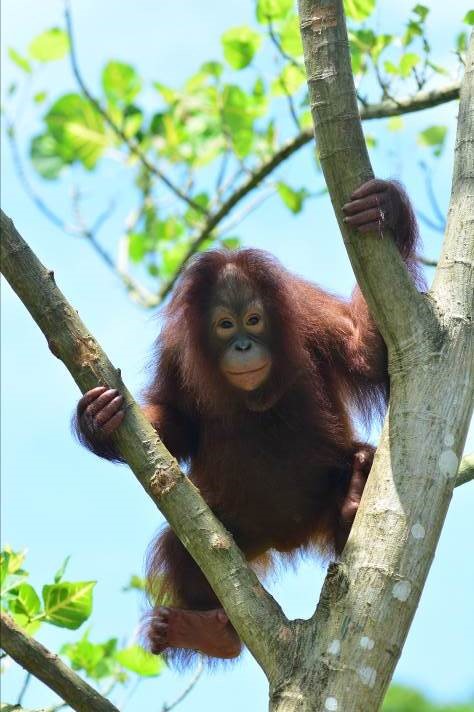
Jessica was rescued from a local town where she was being kept as a pet in 2016. In spite of this she retained her natural instincts well and didn't take long to adapt to life in the trees. At 5 years of age, she is advanced in her progress, displaying excellent survival skills.
What Next…?
After keeping a close watch on Ketty and Jessica, staff are now confident that they have the skills required to live in the wild: nest-building, finding food, and climbing to the top of the canopy.
The Soft-Release Programme exists within the same area of forest where orangutans are released. As past experience has shown, once released orangutans are often seen in the forest around camp so we are able to continue to keep a watchful eye on them.
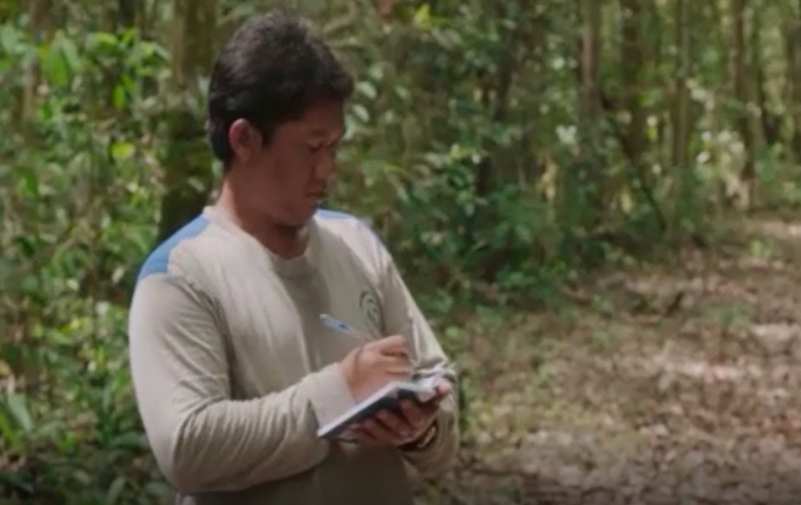
Following release, orangutans are monitored for two weeks so that staff can ensure they are adapting well to living independently. Once released, we hope all will go on to live fulfilling lives in the wild, away from the threat of habitat loss and human activity.
Next week we follow the release of Ketty and Jessica!
Support our Soft-Release Programme and adopt an orangutan today.
All proceeds from our Adoption Scheme go towards medical treatment, food and care of these orangutans during their time in soft-release.
The Orangutan Foundation's 5 Programmes in Indonesian Borneo
Watch this short video to learn about our 5 ongoing programmes in Indonesian Borneo:
Please help us ensure a future for orangutans, forests and people. To support our work with a donation, please click here.
Thank you.
Meet our Soft-Release Orangutans - Part 2
In this blog post we focus on Camp Buluh, where orangutans in the intermediate stage between being very young and those soon to be released fully into the wild are cared for. The Lamandau Wildlife Reserve in Indonesian Borneo is a protected reintroduction site, where rescued orangutans can be released safely.
From this Reserve we run our Soft-Release Programme for rescued orangutans too young to return to this wild. Watch this short clip to find out how this programme equips these orangutans for a life in the forest:
Reintroduction Camps
There are 5 Camps located in Lamandau:

From our 5 reintroduction camps staff monitor all rescued and rehabilitated orangutans. Depending on the age and development of the orangutan they are placed into one of the camps which is best suited for their needs.
Currently we have 10 orangutans within our soft-release programme.
Meet the orangutans being cared for at Camp Buluh…
Okto
Okto is perhaps the most notorious of the orangutans currently in our care! Starring in Sky 1 and Offspring Film’s “Monkeys – An Amazing Animal Family” and the face of our Adoption Scheme; Okto is a confident yet mischievous 5 year old male.
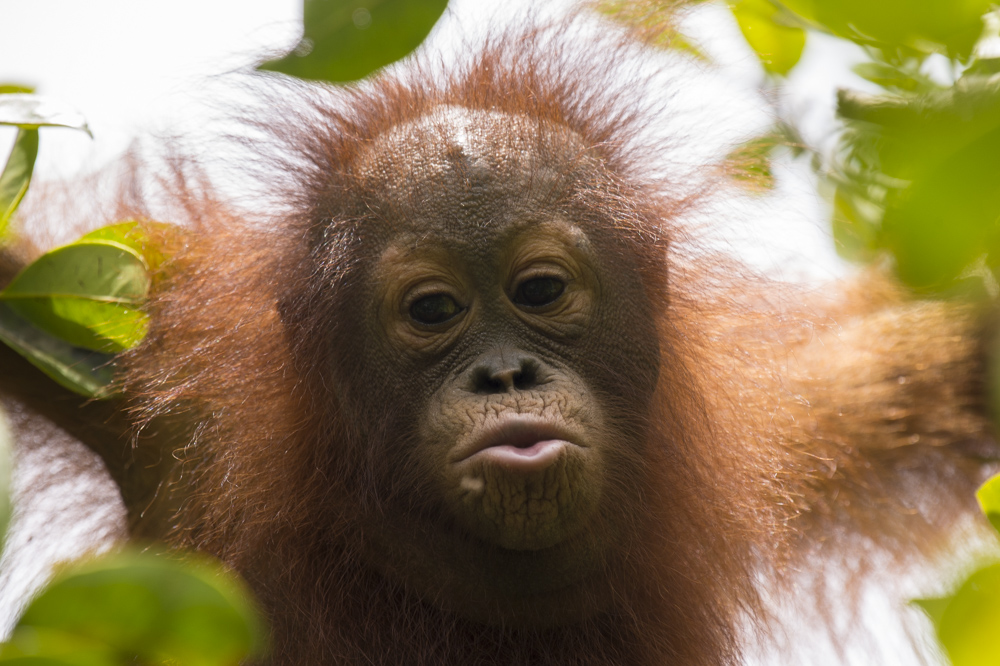
Shifa
Shifa is a female orangutan who was rescued in September 2016 after being kept as a pet for about a year. She initially had problems with hair loss, possibly as a result of stress, but is being treated by the Foundation’s vet and has visibly improved.
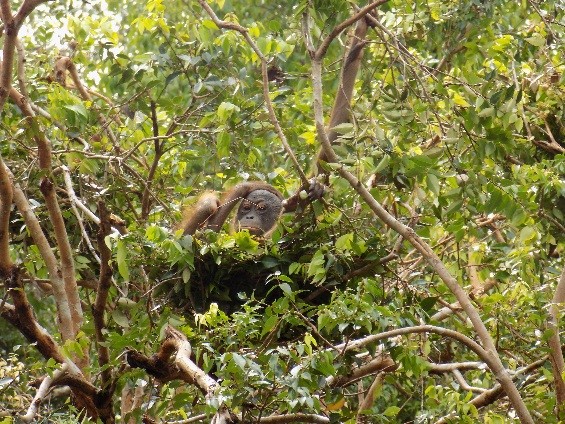
Support our Soft-Release Programme and adopt Okto today.
All proceeds from our Adoption Scheme go towards medical treatment, food and care of these orangutans as they grow and develop.
The Orangutan's world - in pictures
Take a look at the Guardian's story of our new photographic book. https://www.theguardian.com/environment/gallery/2017/may/09/the-bornean-orangutans-world-in-pictures
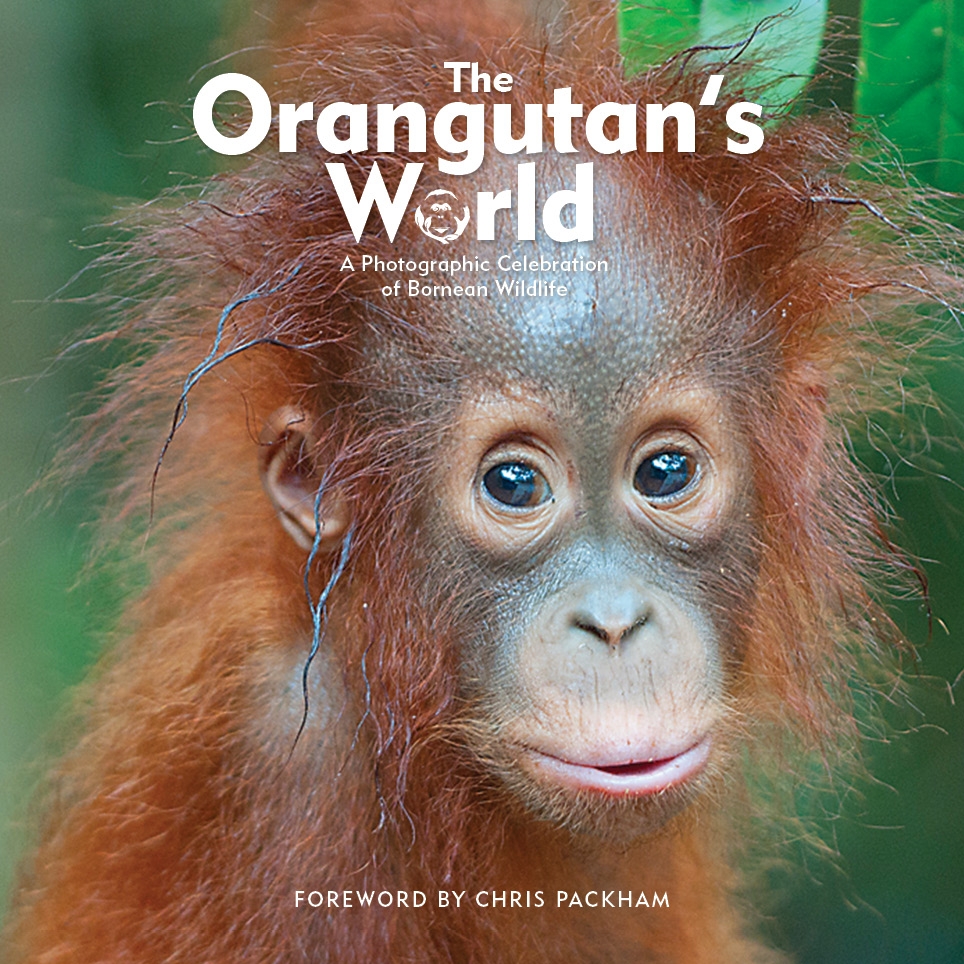
Your can order your copy here for just £20 and all proceeds support our Forest Restoration Programme in Central Kalimantan, Borneo.
Meet Our Soft-Release Orangutans - Part 1
The Lamandau Wildlife Reserve in Indonesian Borneo is a protected reintroduction site, where rescued orangutans can be released safely. From this Reserve we run our Soft-Release Programme for rescued orangutans too young to return to this wild. Watch this short clip to find out how this programme equips these orangutans for a life in the forest:
Reintroduction Camps
There are 5 Camps located in Lamandau:

These camps monitor all rescued and rehabilitated orangutans. Depending on the age and development of the orangutan they are placed into one of the camps which is best suited for their needs.
Currently we have 10 orangutans within our soft-release programme.
Camp JL is where the very youngest orangutans are placed.
Meet Timtom
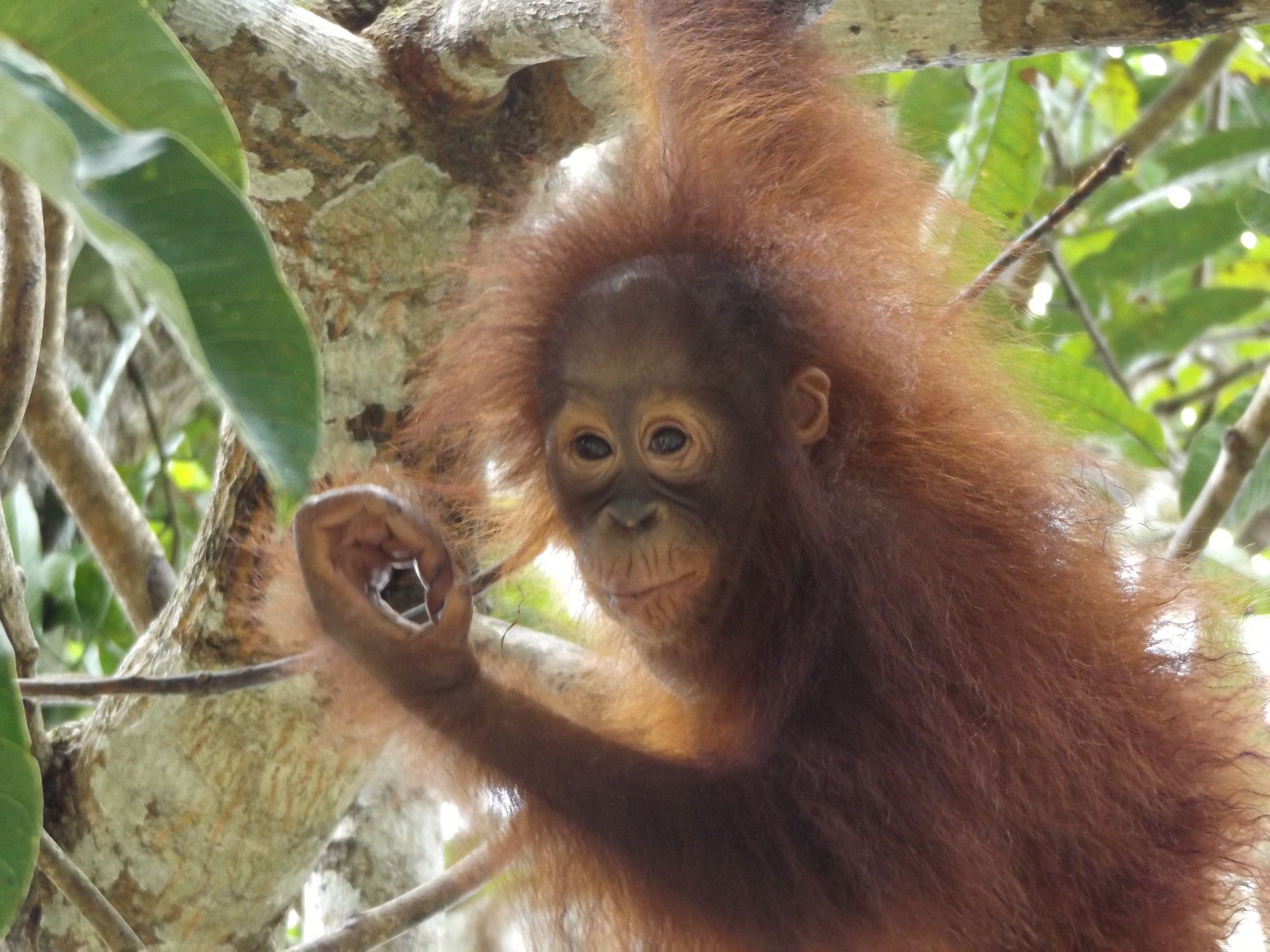
Timtom was just nine months old when she was rescued last January. Not surprisingly, she was not too confident at first as at this age she should still be in the care of her mother, but has now begun to show great improvement. Once cautious, she now climbs happily to the top of a tree.
Meet Mona
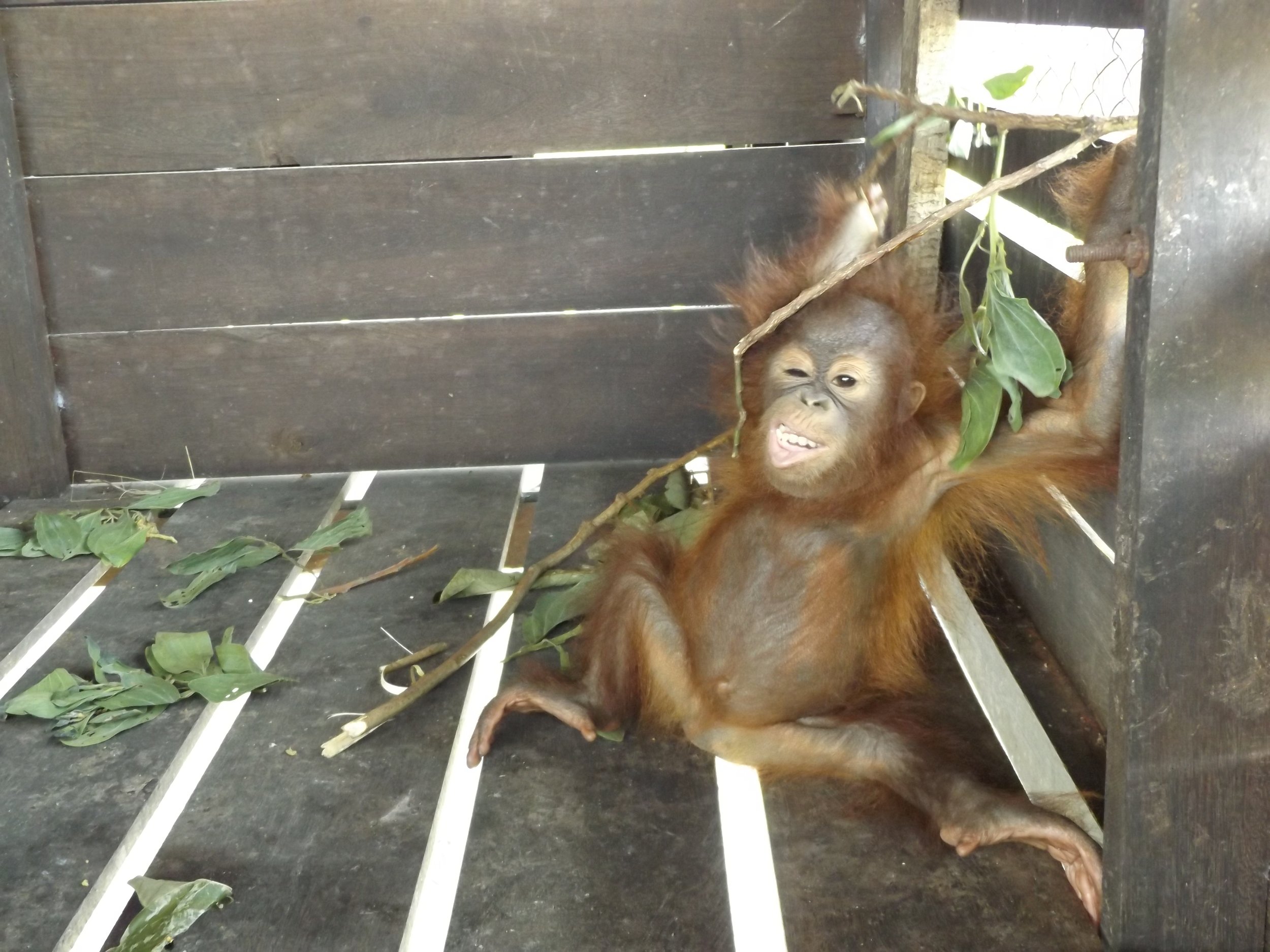
Mona is a female orangutan, just 2 years old. She was recently rescued in March 2017 from a family in a local village who were keeping her as a pet. With no mother she looks to Nyunyu for company, who was rescued around the same time.
Meet Nyunyu
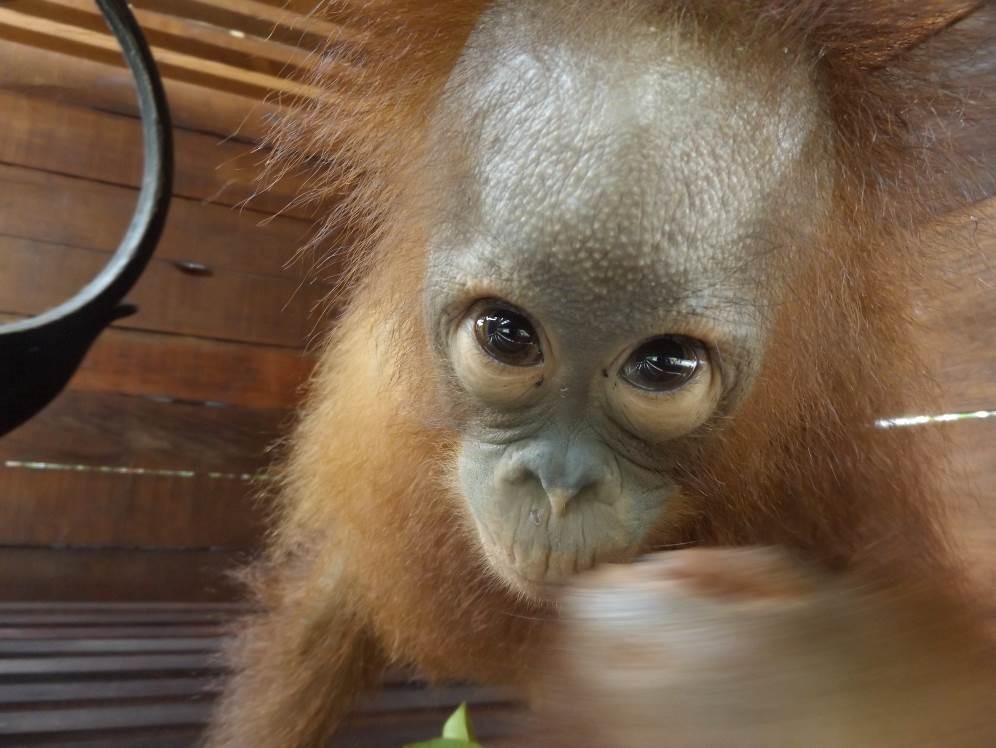
Nyunyu, female around 3 years old. She displays more wild behaviour than Mona, despite being kept as a pet for about 2 years. She was found tied up in a garden, but now shows her adventurous side when climbing.
Meet Boy
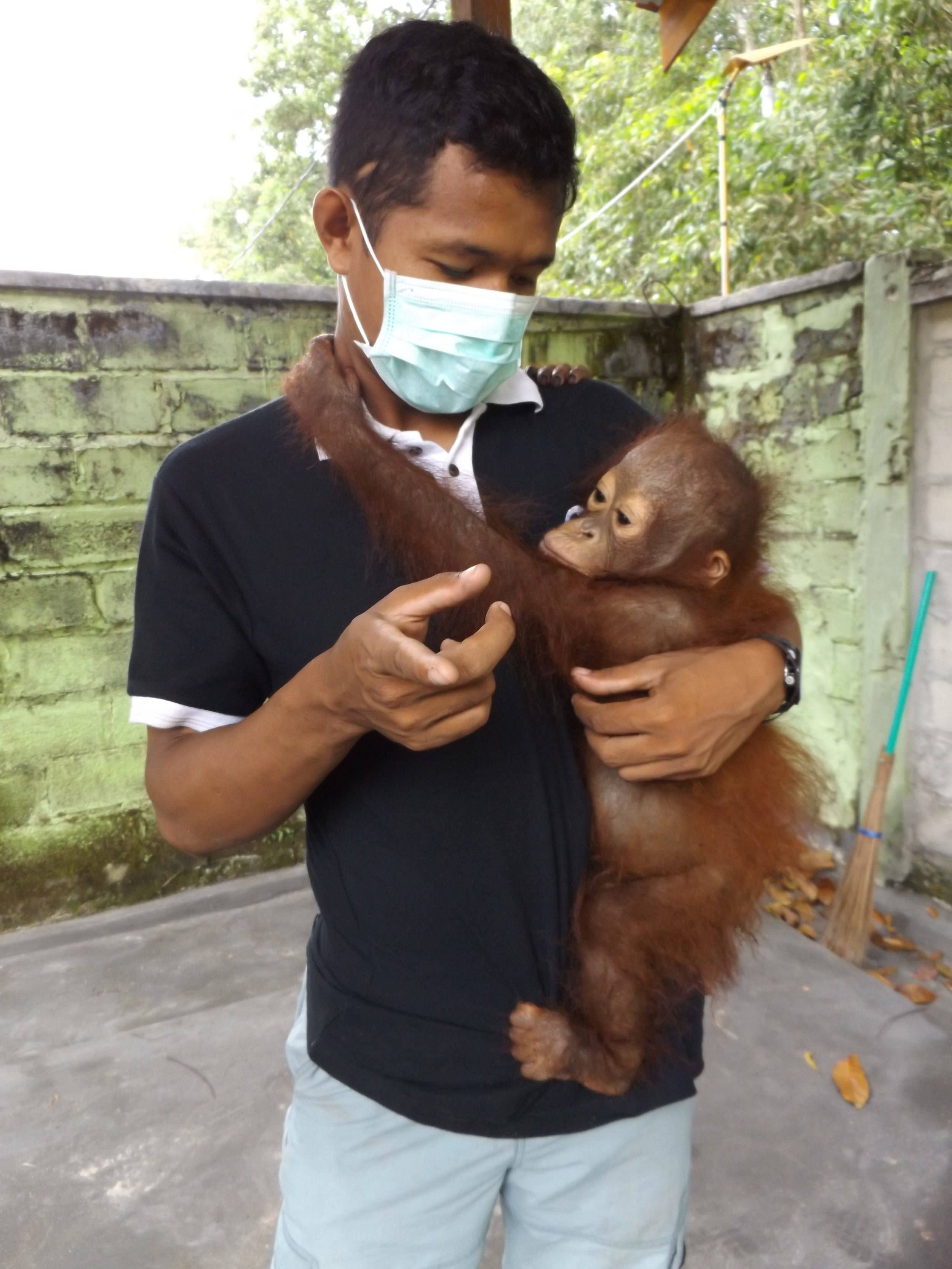
Boy is the most recent orangutan to join the Programme, a male aged about 3 years. He had been kept as a pet for 3 months and was given up by locals of a nearby village.
Another young orangutan is being cared for at Camp Siswoyo.
Meet Satria
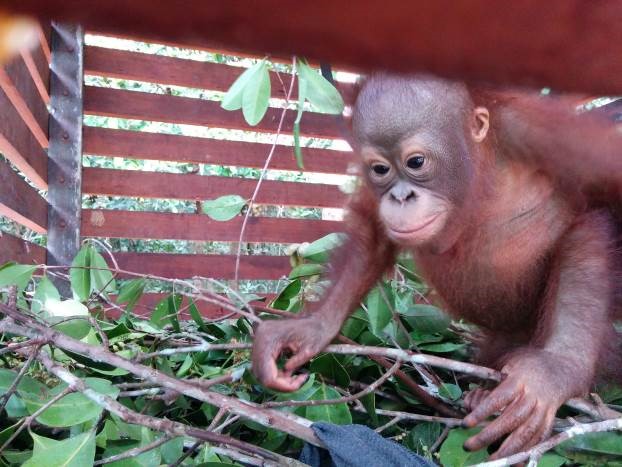
Satria is a male orangutan rescued last June, around 2 and a half years old. He has now started foraging, but is still very young and has a lot to learn.
Next week we look forward to introducing you to more of our soft-release orangutans!
Young orangutans confiscated and are now on the path to being wild again
Last week, Dr Steven (Orangutan Foundation's vet) went to see two orangutans that BKSDA, the wildlife department, had obtained from a citizen in the town of Sampit, Central Kalimantan, Indonesian Borneo. How the orangutans came to be pets, we don't know. However, we do know that the orangutan's mothers would certainly have been killed in order for their babies to have been taken from them. Orangutans are protected by law in Indonesia. It is illegal to persecute, own or trade orangutans yet prosecutions are rare.
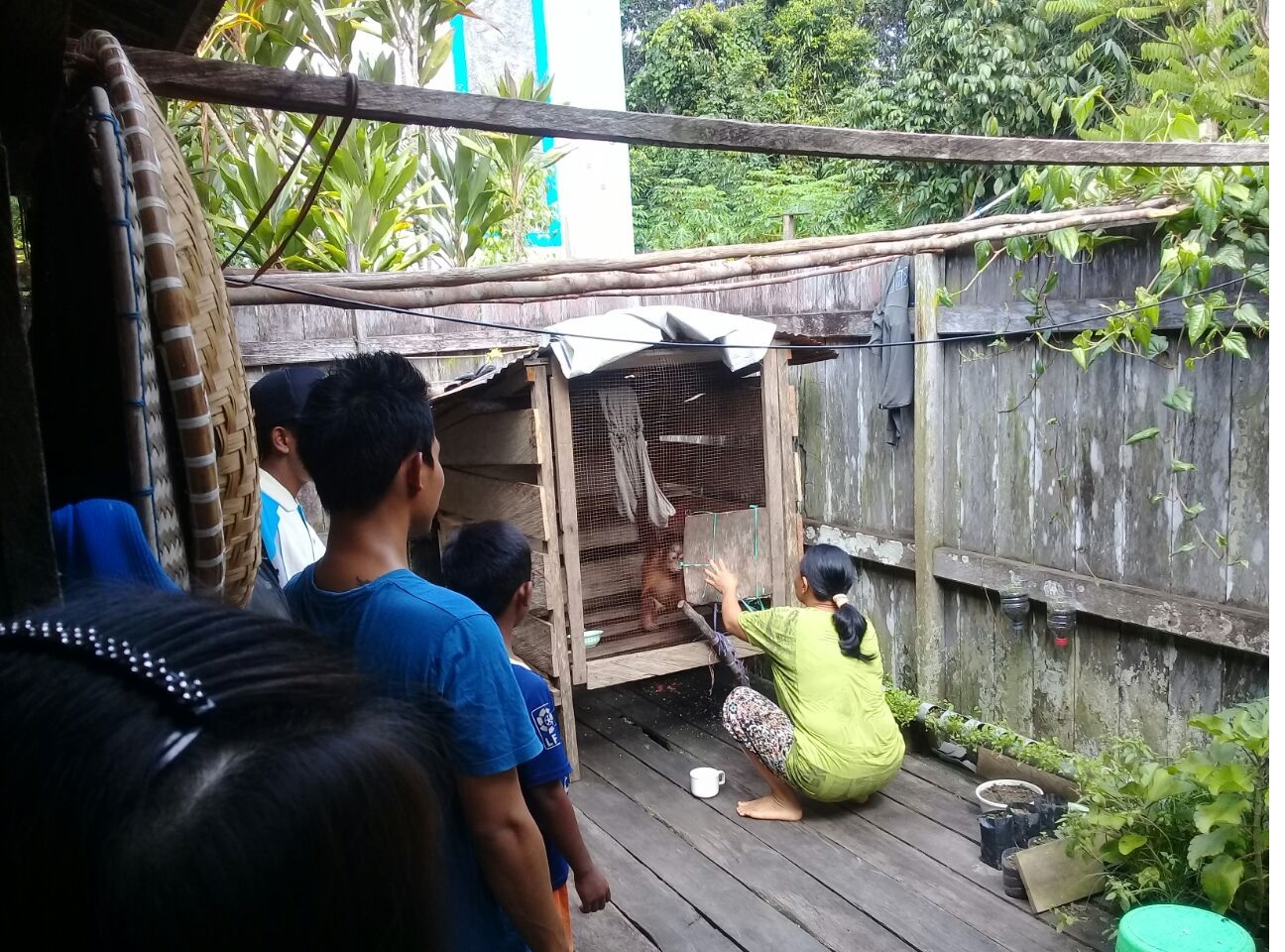
One of the orangutans is about two years old and she has been named Mona .
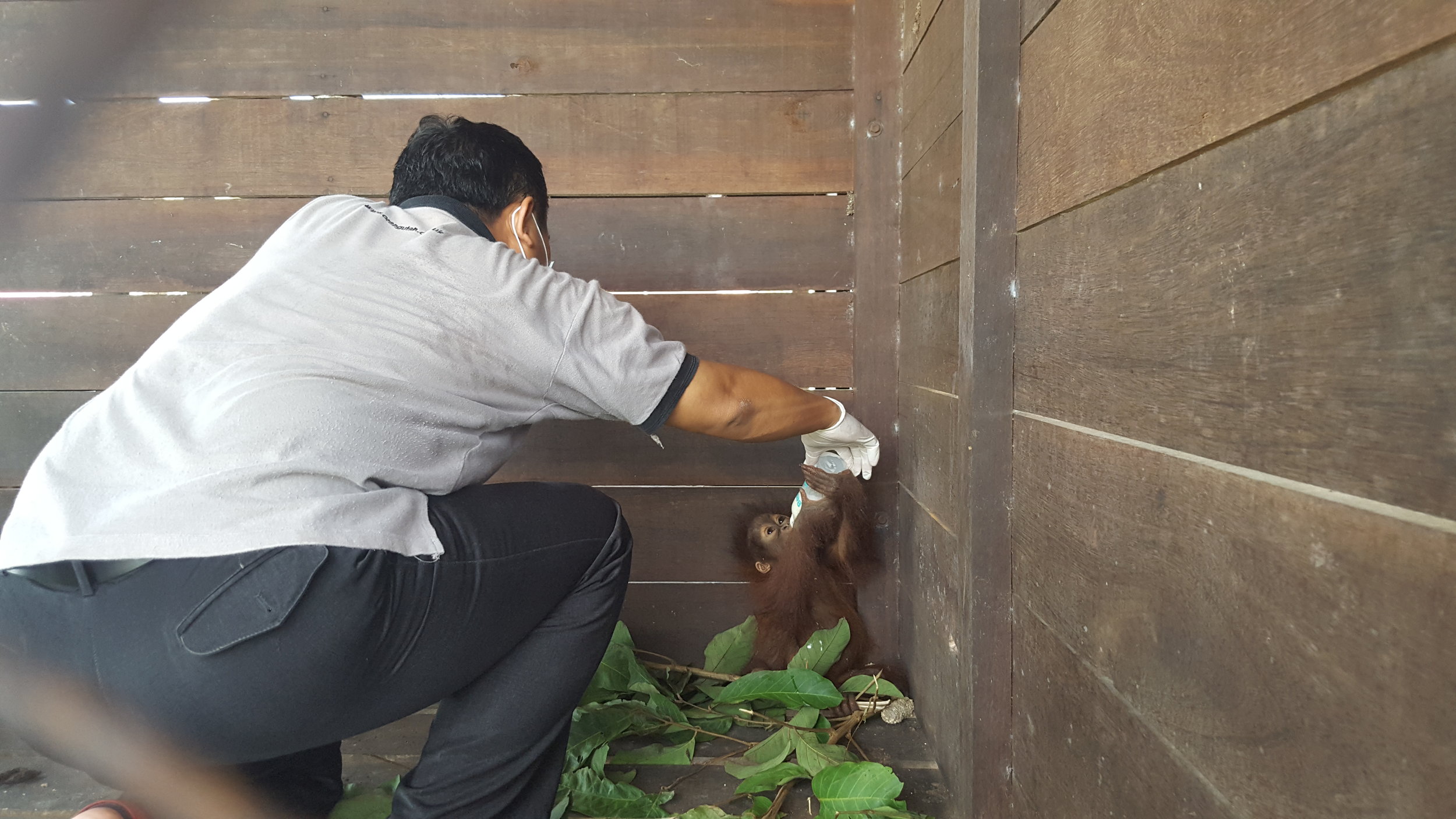
The second orangutan is about three years old and has been named Nyunyu. She had been kept as a pet for two years and when found was chained up around the neck.
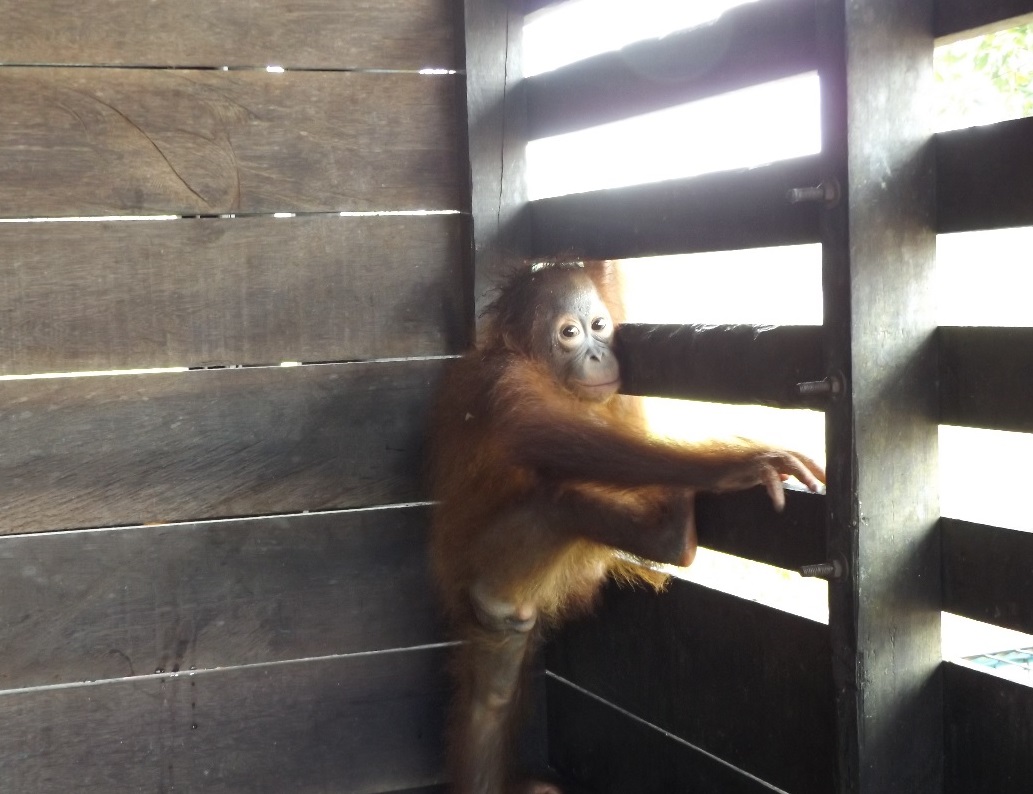
Nyunyu does not like human contact but Mona is much easier to approach. Dr Steven said they are both in good condition and are suitable for the Orangutan Foundation's soft release programme.
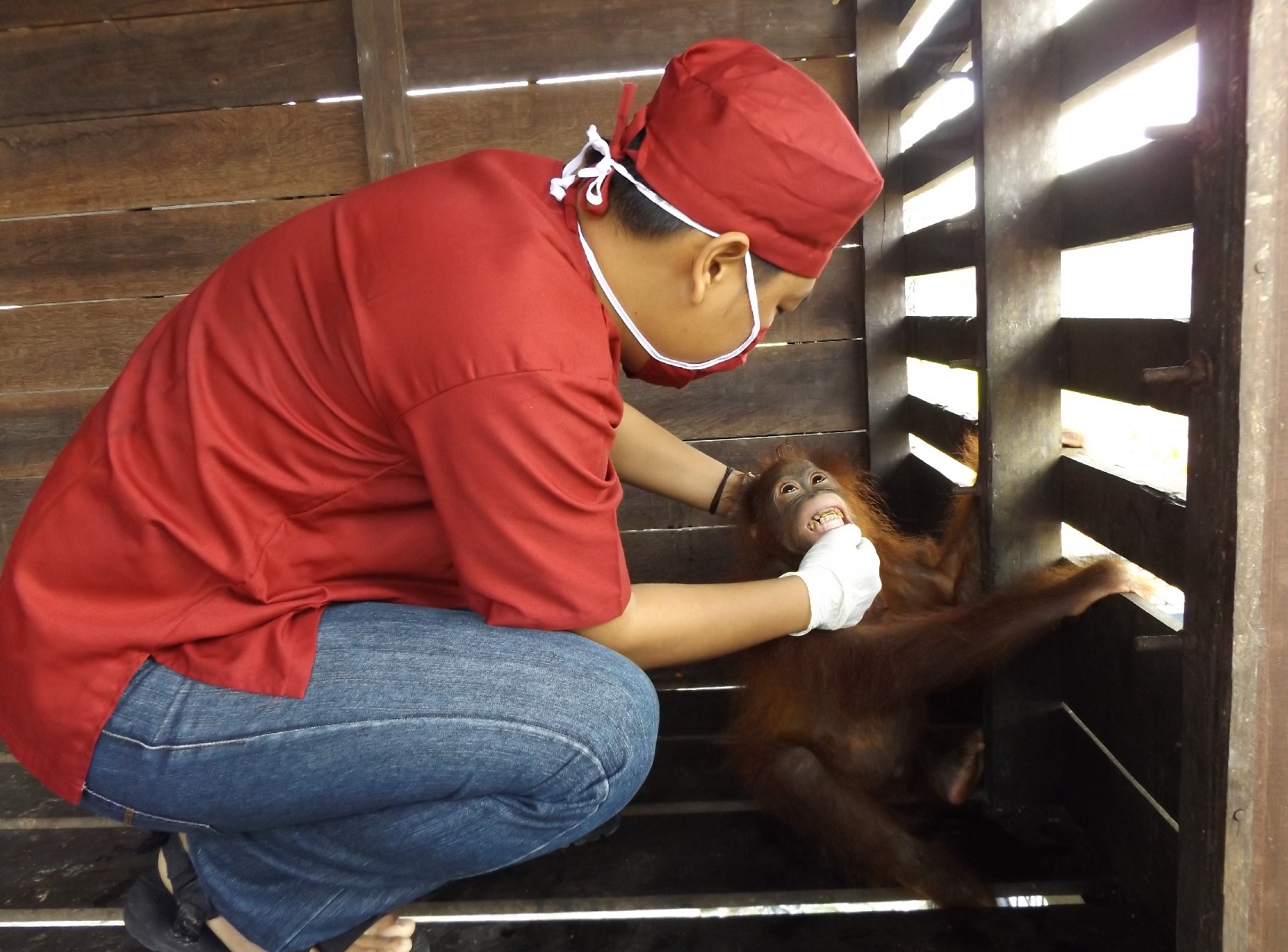
They are now living at Camp Buluh, in the Lamandau Wildlife Reserve. Here they will learn the skills to survive in the wild such as foraging for food and building nests to sleep in but it will be a few years before they are ready to be fully released.
We need your help - please donate to support our vital work rescuing and helping these orangutans return to a life in the wild.
Thank you,
Orangutan Foundation
Images of newborn orangutan
We are delighted to share these wonderful images of a newborn orangutan, taken by Azhari, the Orangutan Foundation's Orangutan Reintroduction Manager. The mother is Paula and she was released into the Lamandau Wildlife Reserve, Indonesian Borneo, in 2003. Her new baby, who has been named Paul, was born 25th December.
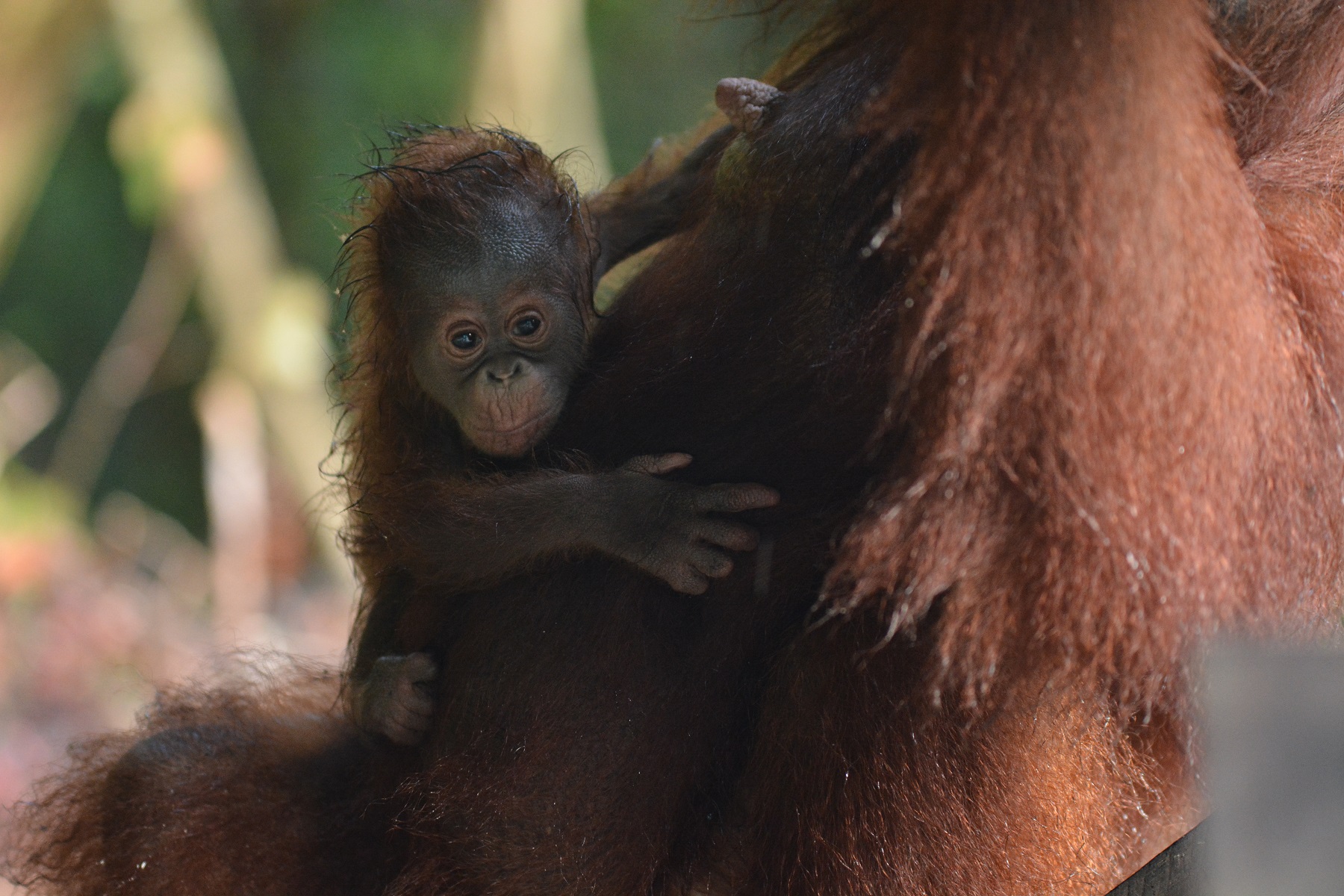
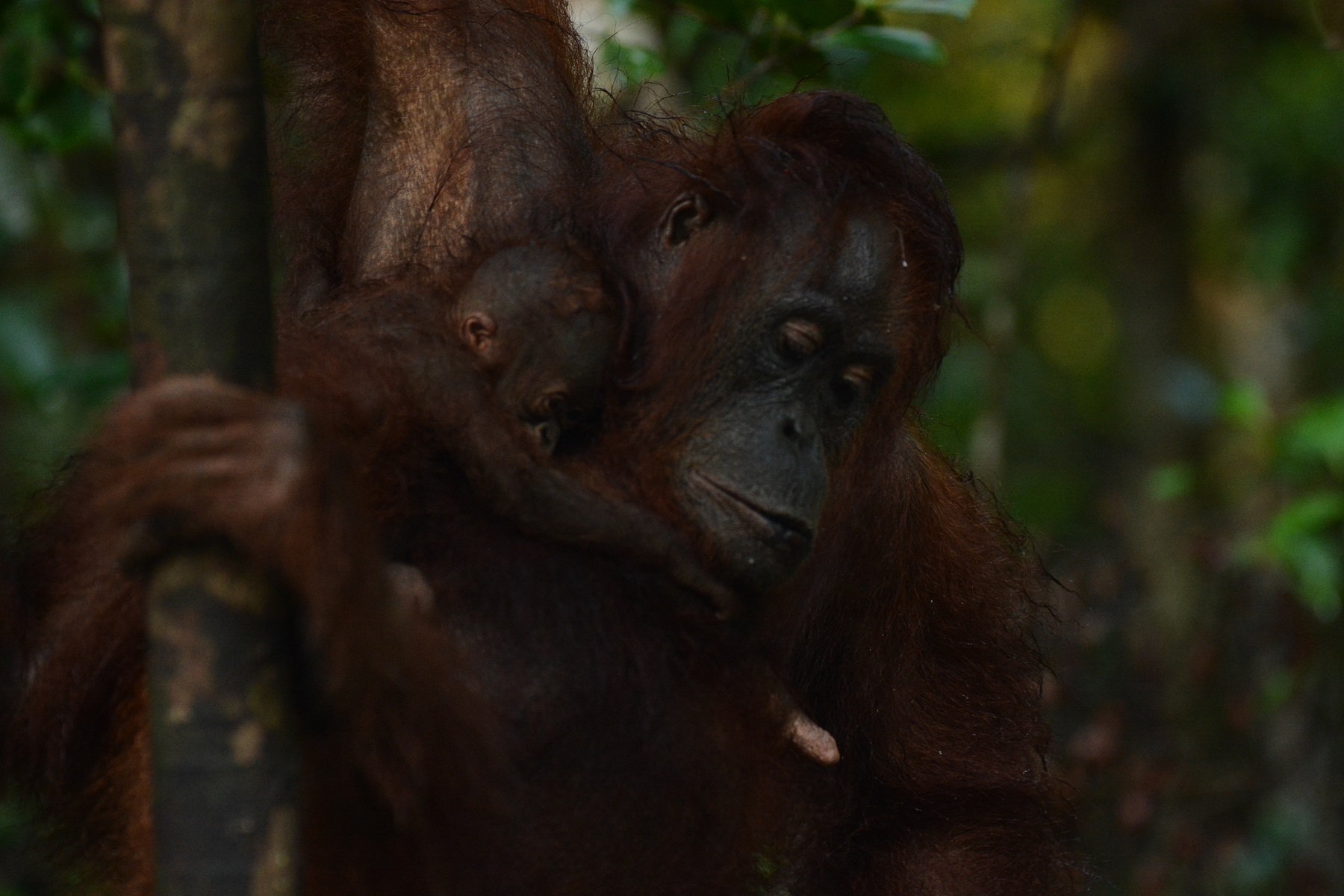
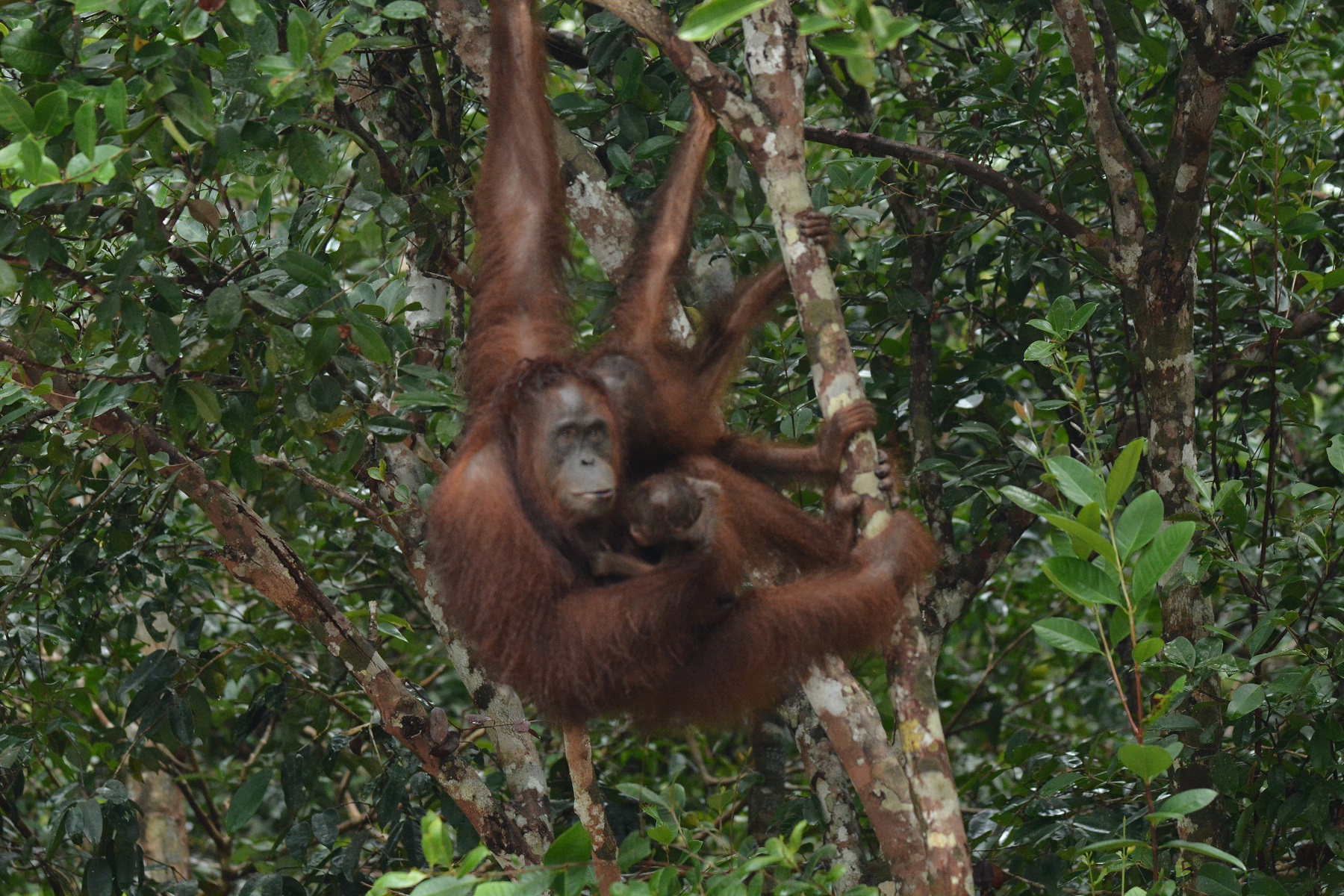

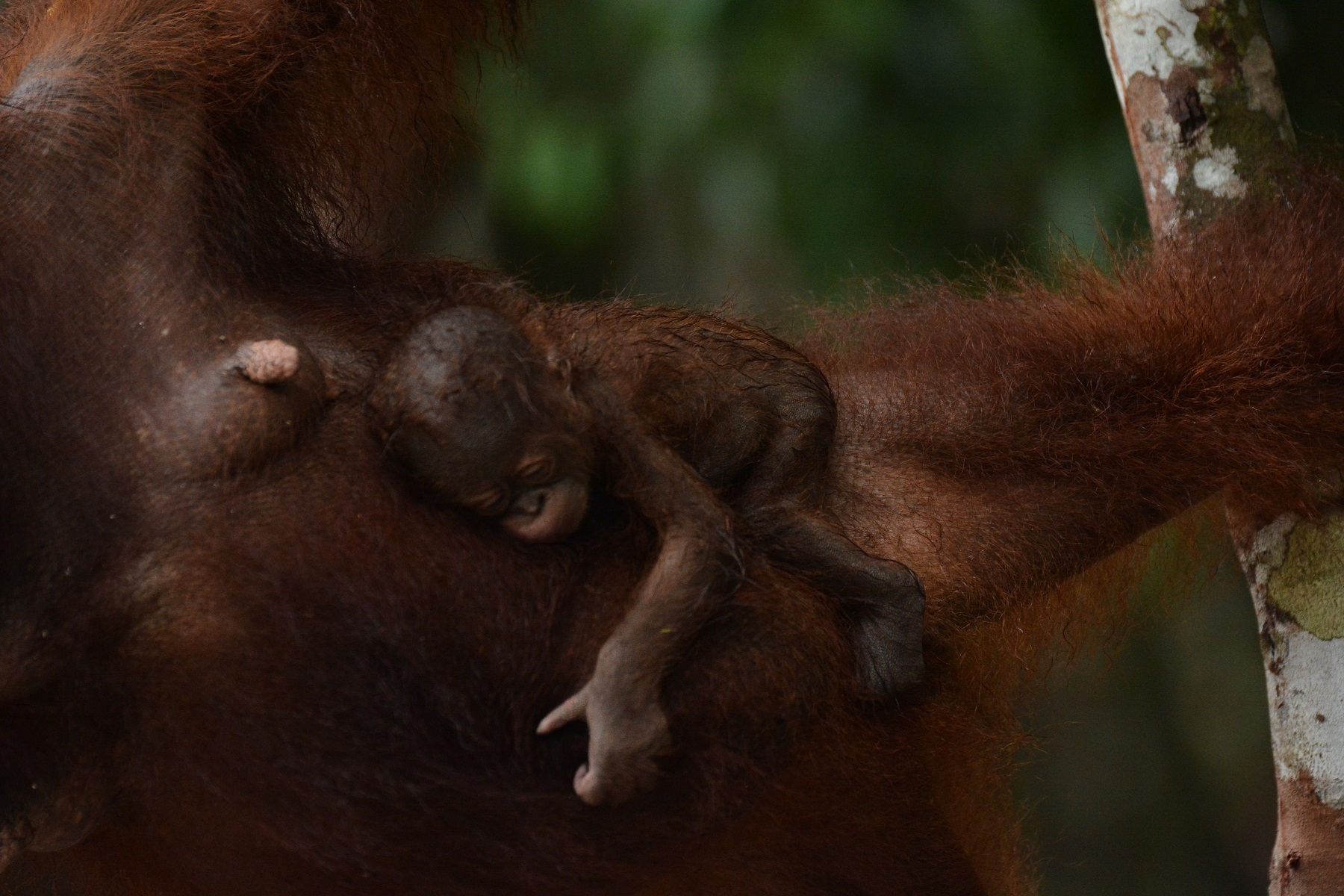
Donate to help us protect the Lamandau Wildlife Reserve, key habitat of the critically endangered orangutan.
Thank you,
Orangutan Foundation
Brahminy kites, Bornean sun bears and orangutans...
Blogpost by Steven Daud, Orangutan Foundation vet, in Central Kalimantan, Indonesian Borneo. Yesterday, 14 December 2016, we go by speedboat to the Camp Siswoyo and Camp Buluh, in Lamandu Wildlife Reserve, as part of our regular visits. First, we stopped at the Post Teringin Lama to check on a Brahminy kite, named Jack. He was obtained from citizens in Sampit. Jack came to us with many missing wing feathers so Jack cannot fly far away.
Because of that, we decided to put Jack at Guard Post Teringin Lama and the staff at the Post have responsibility of taking care of Jack. At first, Jack only at around the Post jetty, but now Jack seen already getting used to roost in the forest near the Post.
After Post Teringin Lama, we went to Release Camp Siswoyo for checking the latest condition of Bruno and Satria. Bruno is a Bornean sun bear and already in Camp Siswoyo since October and seemed to have a skin problem, but due to treatment it’s much better.
Satria is an orangutan undergoing soft release. Rescued in June and is about 2 and ½ years old and he is in a healthy condition and doing well. To stop infection by the parasite, I give anti-parasitic drugs to prevent transmission of disease, which I suspect comes from Bearded Pig.
Here is a video of two other young orangutans, Jessica and Timtom, in our soft-release programme, made by Azhari, our Orangutan Reintroduction manager.
Thank you,
Steven - Orangutan Foundation vet
Please support our work in returning these critically endangered orangutans and other wildlife species back to the wild, where they belong. Click to donate.
Thank you.
Wonderful images of young Bornean orangutans learning to survive in the wild
Here’s another field update, with some wonderful images, from Orangutan Foundation vet Steven Daud, on some of the younger orangutans in the Lamandau Wildlife Reserve, Indonesian Borneo. A couple of days ago, we made our routine health and monitoring visits to Camp Rasak and Camp JL, two orangutan release camps, within the Wildlife Reserve. This journey is by speedboat as the camps can only be accessed by river.
Our first stop was Camp Rasak, where orangutans Jessica, Timtom and Endut live. These orangutans are on a soft-release programme.
We took Jessica, Timtom and Endut out from their enclosure so they can learn to make a nest and play in the trees. Jessica’s ability to make the nest is clearly visible. While Timtom and Endut are seen to be very brave exploring the trees, where they hone their skills of survival.
Nowadays, the weather is unpredictable which has caused Timtom to catch a cold. We are giving Timtom vitamin supplements and medication to help her get healthy again.
After Camp Rasak we got back into the speedboat and went to camp JL to monitor Okto and Ketty. Before orangutans can be fully released back into the wild they must be able to make a nest to sleep in. Ketty has shown that she can make a nest. However, Okto still has difficulty with this skill and sometimes even tries to interrupt Ketty's nest-building.
In terms of health, Okto and Ketty are both in good condition and this is maintained by giving them vitamin supplements. To minimise disease transmission between the orangutans and humans, staff in contact with the orangutans must wear gloves and masks.
I hope you enjoy the photos.
Regards,
Steven (Orangutan Foundation Vet)
As always, we are immensely grateful to the Orangutan Foundation staff in Indonesia for their hard work and commitment. You can support this work by Adopting Okto (a unique Christmas present of real value) by visiting our online shop. There are plenty of other wonderful Christmas present ideas too. Last day for ordering before Christmas is Friday 16th December. Thank you.


